

A Summer of IMPACT
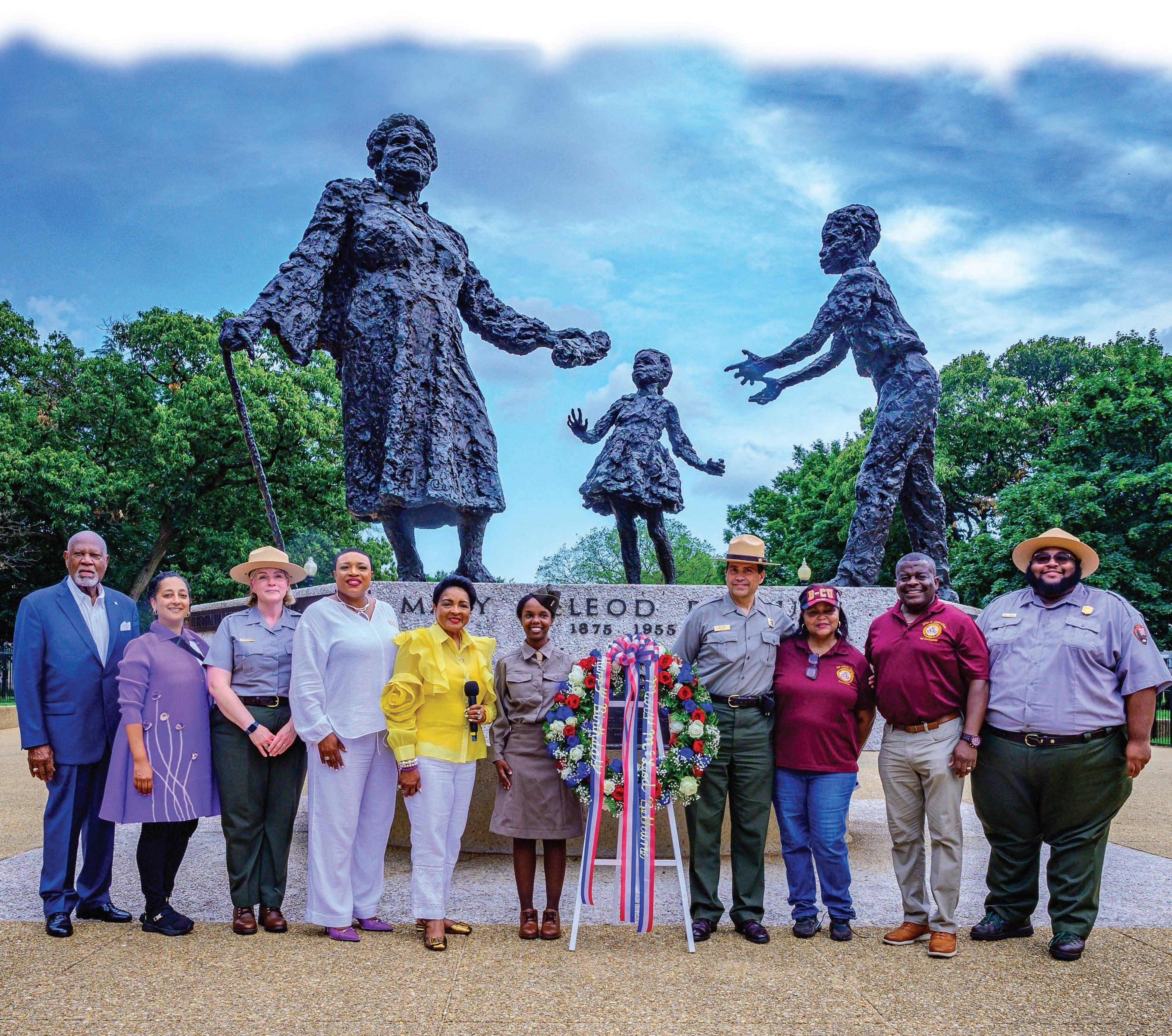


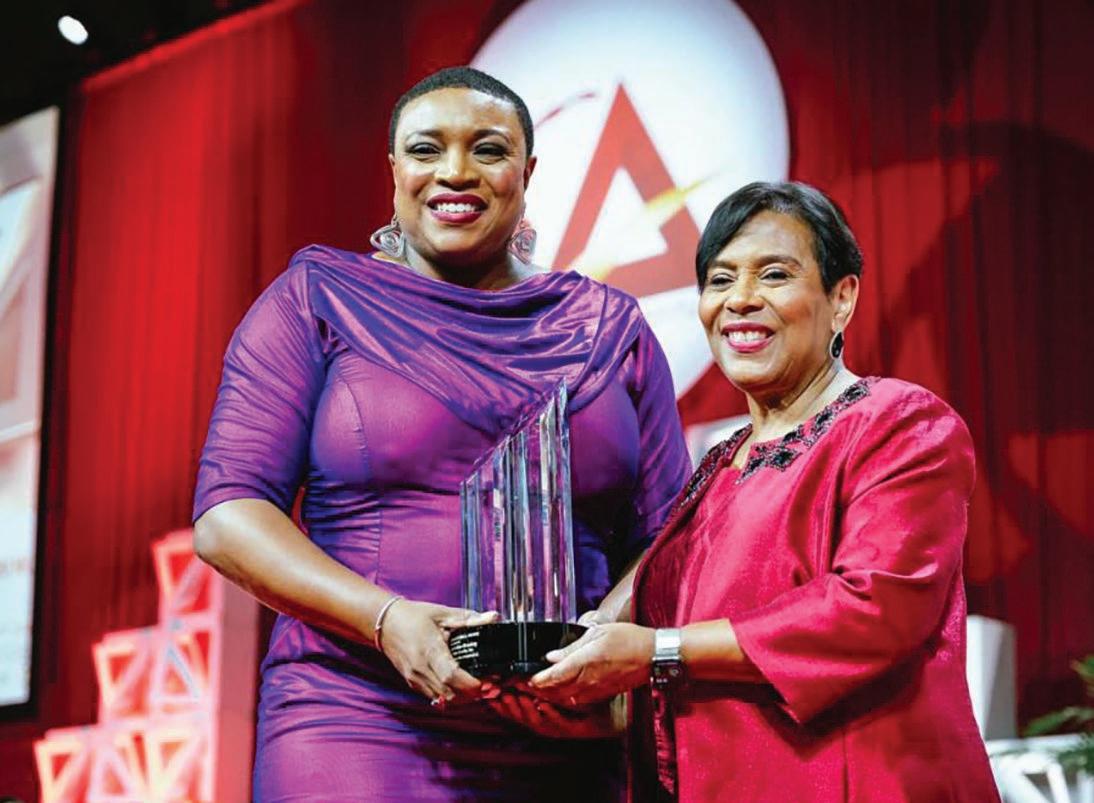
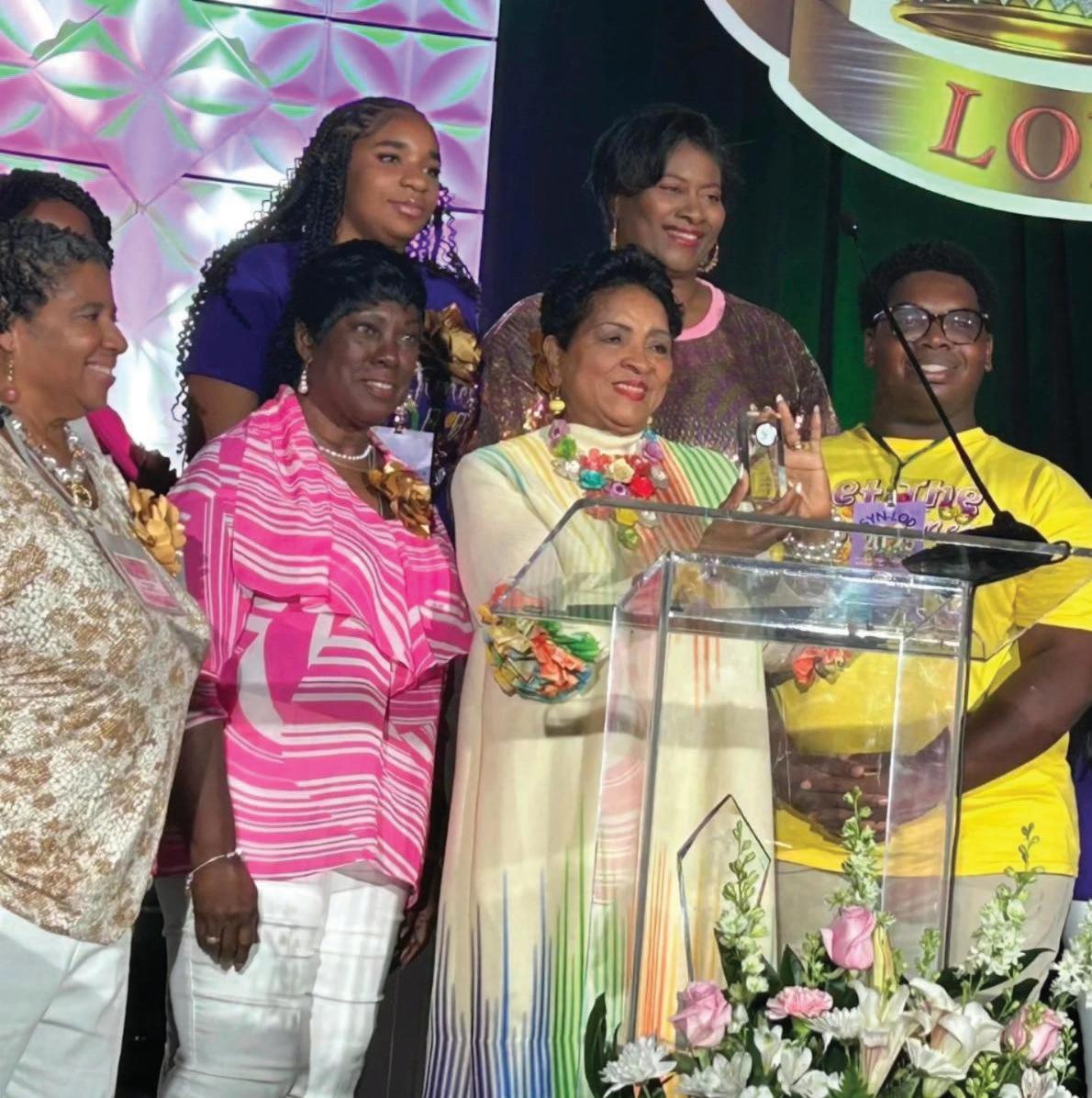
Shavon Arline-Bradley receives the Mary Church Terrell Award for leadership and advocacy from NCNW affiliate Delta Sigma Theta Sorority, Inc.
Dr. A. Lois Keith receives Community of Service in Action Award from NCNW affiliate the Top Ladies of Distinction, Inc.
COVER PHOTO: NCNW, Bethune-Cookman University, and National Park Service leaders gather in Washington, D.C. to honor the 150th birthday of Dr. Mary McLeod Bethune.
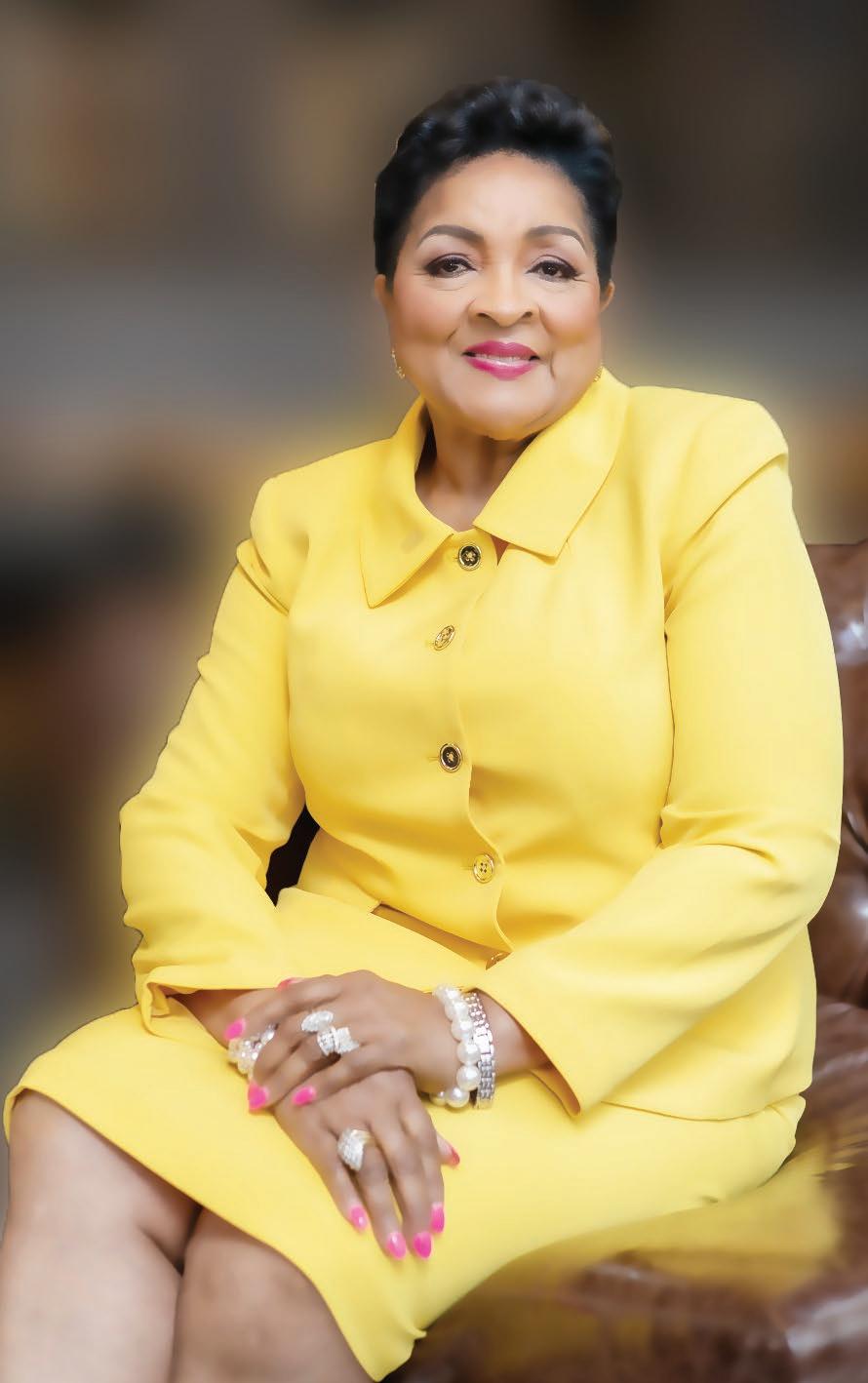
As we look forward, I invite you to mark your calendars and make plans to join us in celebrating our 90th Anniversary— a milestone that speaks to the endurance of Dr. Bethune’s vision and the extraordinary women who have carried it forward.
Message from the Chair
Greetings NCNW Sisters,
Igreet you with gratitude and pride as we reflect on a summer filled with extraordinary moments of service, celebration, and sisterhood. Together, we continue to honor our past, build in the present, and prepare boldly for the future of the National Council of Negro Women.
NCNW came together to honor the life work and 150th birthday of our founder, Dr. Mary McLeod Bethune. We engaged in a month-long celebration this July that included a deeply meaningful gathering at our national headquarters, where past presidents and board members joined us in reflection. These moments reminded us of the greatness in our legacy and the responsibility we carry to preserve it.
This season, I was humbled to receive the Community of Service in Action Award from the Top Ladies of Distinction, Inc. (TLOD) at their 60th SYNLOD in New Orleans. I serve NCNW affiliate TLOD as the Good Health WINs Ambassador. The award is a reflection of the NCNW ongoing commitment to vaccine confidence and health equity.
Even as we create great impact in our communities, we are also strengthening ourselves internally. Under the guidance of our board, we continue to implement new procedures and initiatives designed to make NCNW more effective, transparent, and resilient. This work is vital to ensuring that our organization remains strong for the next generation of women leaders.
As we look forward, I invite you to mark your calendars and make plans to join us in celebrating our 90th Anniversary—a milestone that speaks to the endurance of Dr. Bethune’s vision and the extraordinary women who have carried it forward. I also encourage you to secure your tickets for this year’s Uncommon Height Honors, where we will lift up leaders whose lives and work reflect the spirit of our founder, and the leadership of President and Chair Emerita Dr. Dorothy I. Height, for whom the program is a namesake. This is not only an opportunity to celebrate, but also to sustain our mission for decades to come.
Sisters, our journey is both historic and urgent. I thank you for your continued dedication, and I look forward to standing with you as we move confidently into our 90th year and beyond.
Sincerely,

Dr. A. Lois Keith National Board Chair
Message from the President
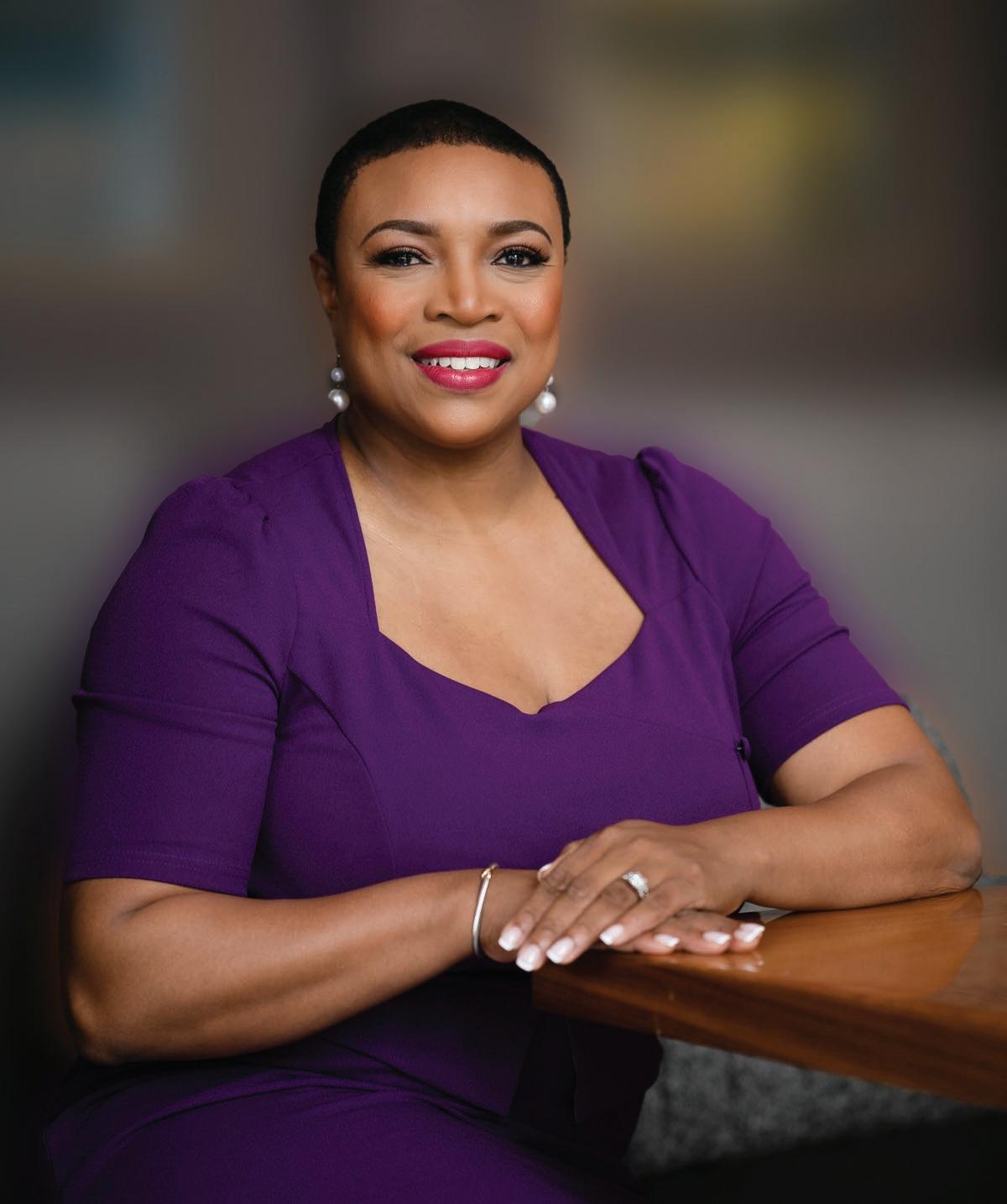
Greetings NCNW Sisters,
As we close out a powerful summer season, I write to you with both gratitude and resolve. This year, NCNW has demonstrated extraordinary moments of advocacy, leadership, and sisterhood that affirm our enduring role as the voice for Black women – as the Home of the 92%.
On Capitol Hill this summer, the NCNW Advocacy and Policy Team convened the first NCNW-led briefing. This compelling panel addressed advancing pay equity for Black women. Our voices are shaping the national agenda.
This summer also marked 62 years since Dr. Dorothy I. Height helped to plan and execute the March on Washington for Jobs and Freedom. In that spirit, NCNW proudly carried the torch forward as a partner in the March on Wall Street. Our presence was a declaration that diversity, equity, inclusion, and justice are not negotiable.
This was also a season of sharing the work of NCNW nationwide. We enjoyed visiting affiliate and partner conventions as well as the Essence Festival of Culture.
At the NCNW affiliate Delta Sigma Theta Sorority, Inc. National Convention, our Past National President Dr. Thelma T. Daley was honored with the International President’s Fortitude Award for her decades of impactful service and lasting legacy. Also, I was proud to receive the Mary Church Terrell Award for leadership and advocacy. These honors are not ours alone—they are a testament to the collective power of NCNW.
“ ”
As we move toward our 90th anniversary in the months ahead, I charge each of you to continue showing up with courage and conviction.
I was also proud to further the conversation on labor rights at the NAACP 2025 Convention. Now, more than ever, Black women and all Black workers must be equipped with knowledge of their rights and connected to opportunities that affirm their dignity in the workplace.
Sisters, these milestones remind us that while the challenges before us are great—whether in protecting DEI, defending democracy, or advancing equity—so too is our power. NCNW stands strong at the intersection of social impact, history, legacy, and leadership.
As we move toward our 90th anniversary in the months ahead, I charge each of you to continue showing up with courage and conviction. Our communities are counting on us to be vigilant, to be vocal, and to be visionary. Together, we will keep building a world worthy of our historic mission and future promise.
Sincerely,

Shavon Arline-Bradley President and CEO
BECAUSE of BETHUNE:
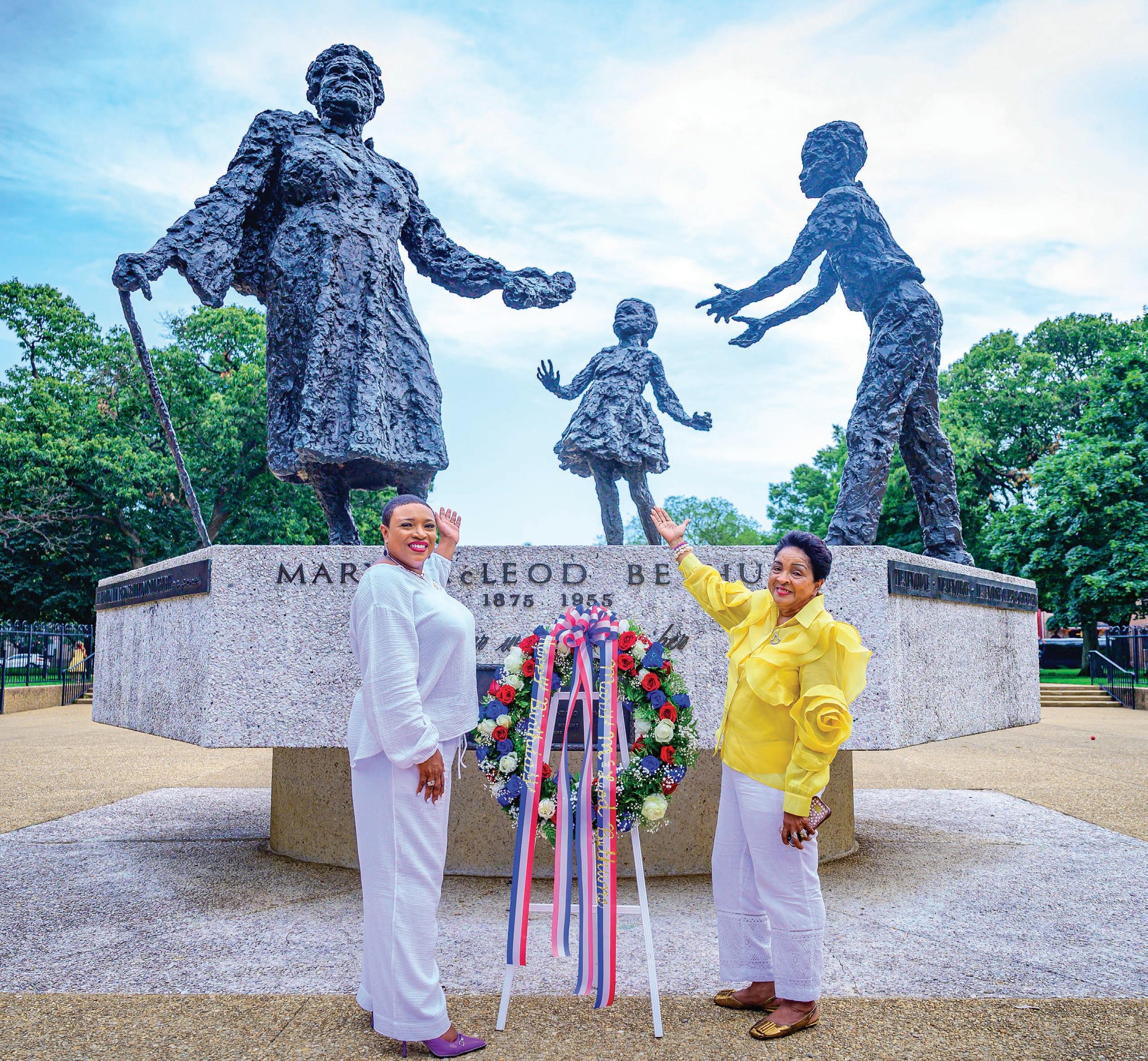
NCNW Summer of Impact and Celebration
This summer, NCNW proudly demonstrated our commitment, unity, and self-reliance through powerful national events, local action, and moments of joy and resistance. From Washington, D.C. to New Orleans to Baltimore, NCNW stood firmly in our mission to serve, empower, and advocate for Black women, families, and communities.
Celebrating Dr. Mary McLeod Bethune’s 150th Birthday
In partnership with the National Park Service and BethuneCookman University, NCNW celebrated the 150th birthday of our beloved founder at her statue in Washington, D.C.’s Lincoln Park. This moving event was part of a month-long celebration that honored her life’s work and enduring legacy.
At NCNW national headquarters, we had the privilege of welcoming past presidents and board members for guided tours that showcased treasured photos, books, awards, and personal items belonging to Dr. Bethune and our esteemed President and Chair Emerita, Dr. Dorothy I. Height. Together, we reflected on their courage and vision—reminders of some of the shoulders on which we stand.
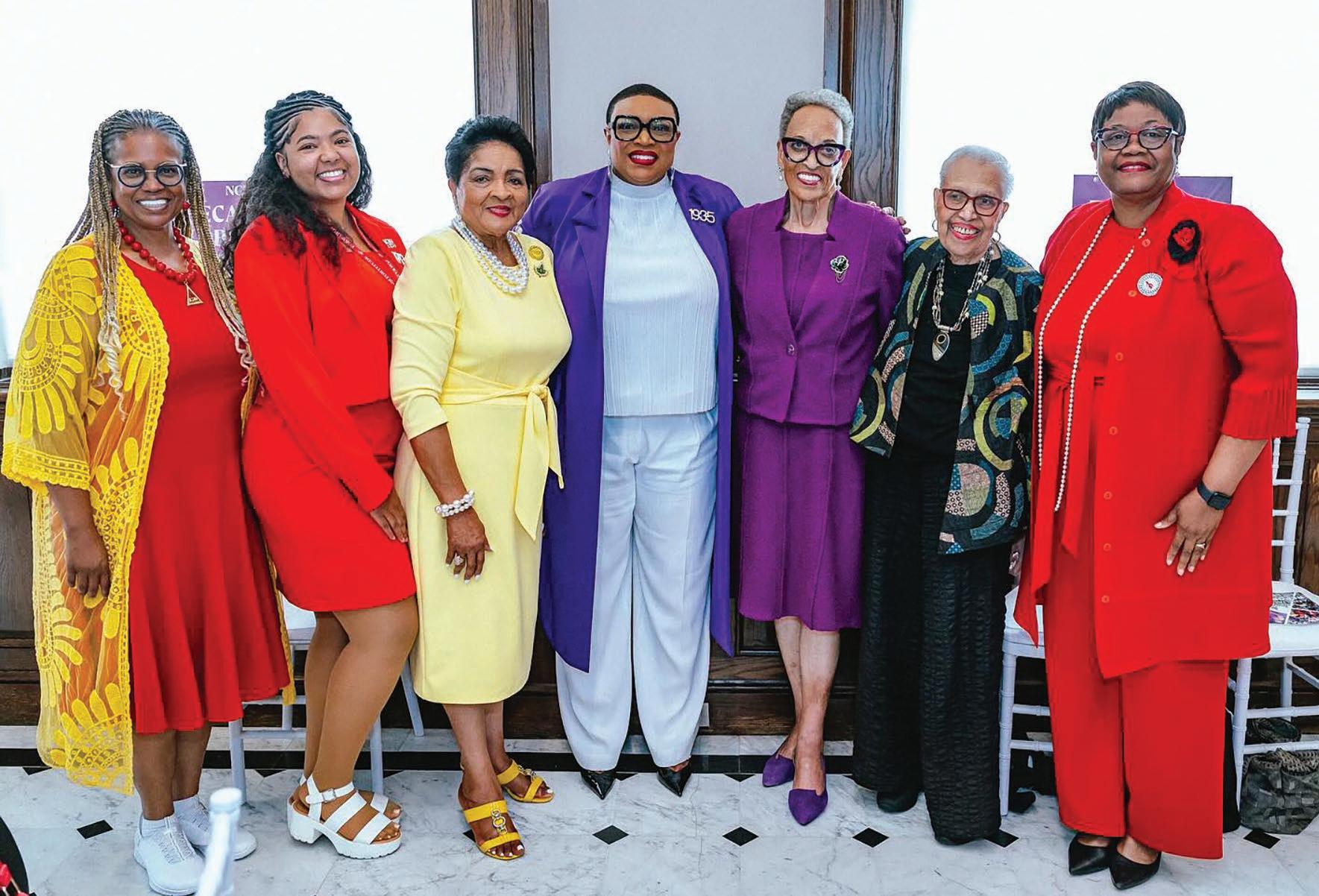
Scan the QR code to view a video recap of the celebration at NCNW headquarters.

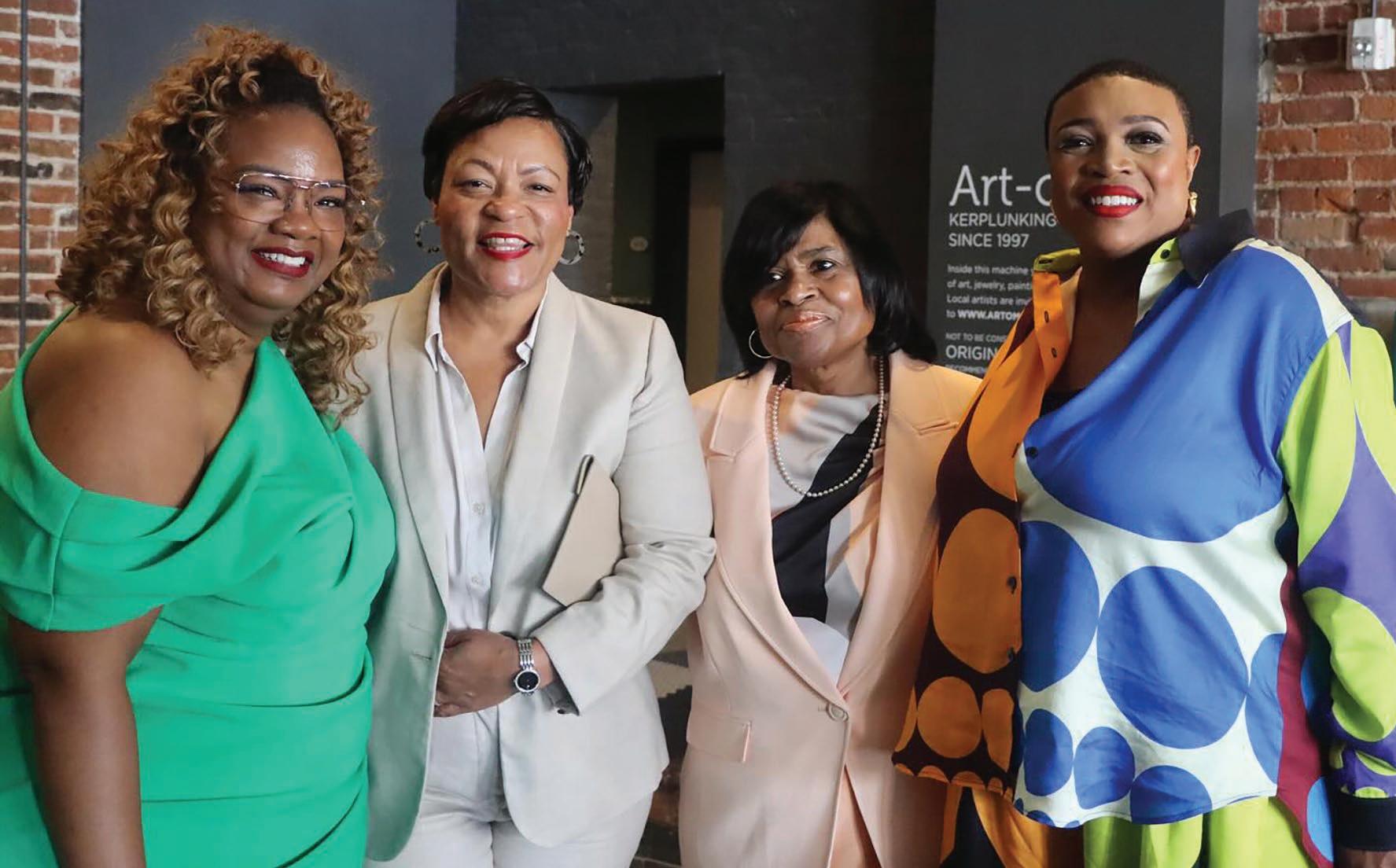
Activating at the Essence Festival of Culture
NCNW staff and supporters had an incredible time at the 2025 Essence Festival of Culture in New Orleans. Our booth became a gathering space filled with love, connection, and sisterhood. We showed up as the Home of the 92% and connected with hundreds of individuals who learned more about NCNW policy advocacy and programs.
This event was also a call to action. We came to Essence to activate, align, and prepare to fight against harmful legislation, oppressive systems, and all barriers to justice. In the midst of the joy, the message was clear: our Direct Service and Direct action are needed immensely in these times of turmoil.

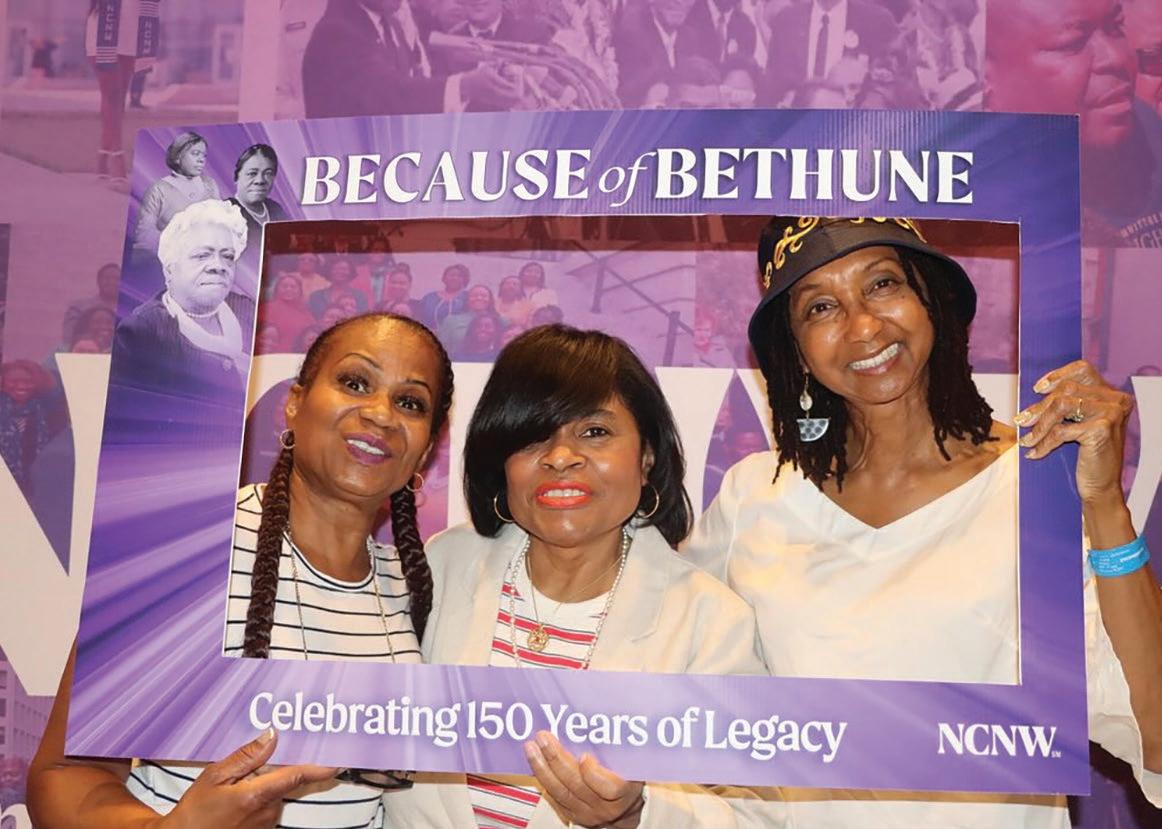



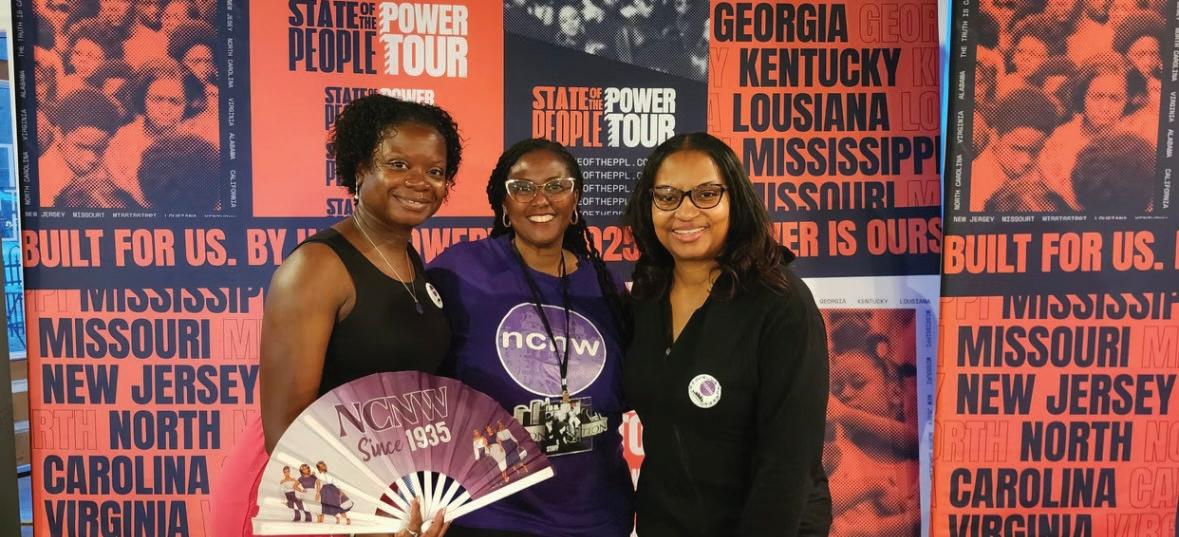
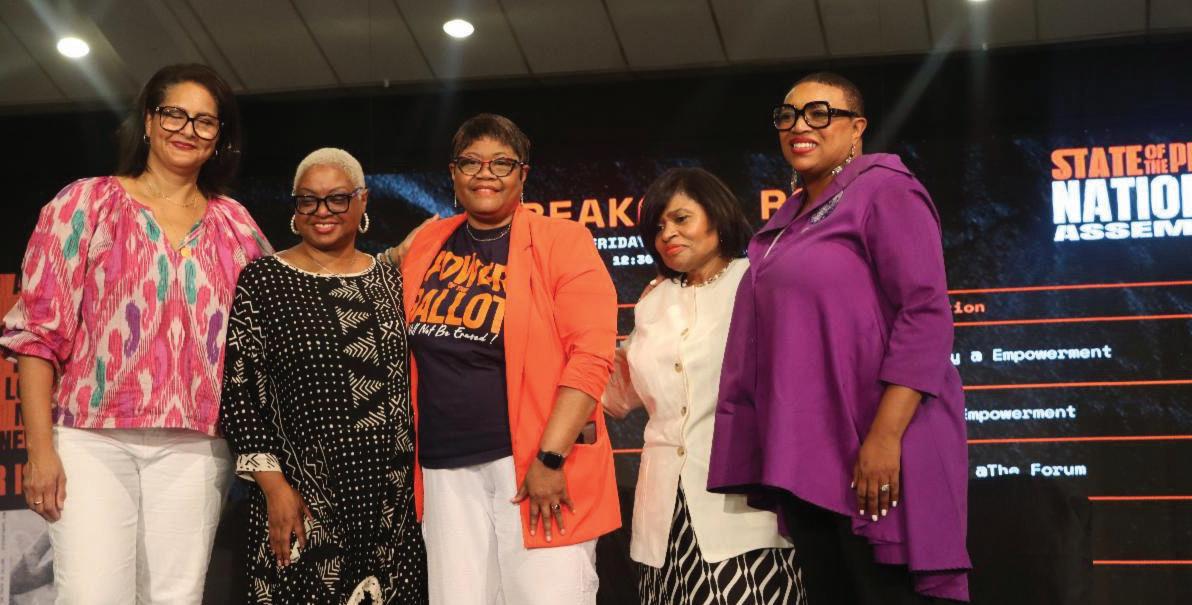
Purple Power: State of the People Power Tour
NCNW proudly partnered with State of the People. This activation kicked off this spring with President and CEO Shavon Arline-Bradley serving as a speaker during a 24-hour online news and information marathon. Next, the State of the People Power Tour traveled across the nation to center community power and collective action. NCNW sections participated in multiple cities, including Los Angeles, Richmond, and Atlanta. At the closing stop in Baltimore, Md., President and CEO Shavon Arline-Bradley took the main stage alongside other leaders to discuss healthcare, self-care, and the strength of community.
Her message was clear: health is power, and showing up for each other is how we rise.
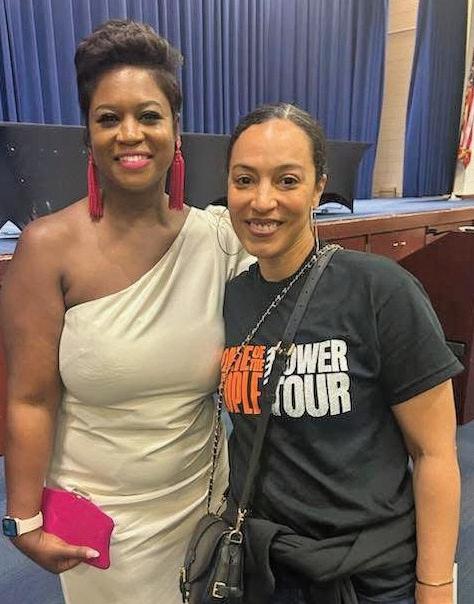
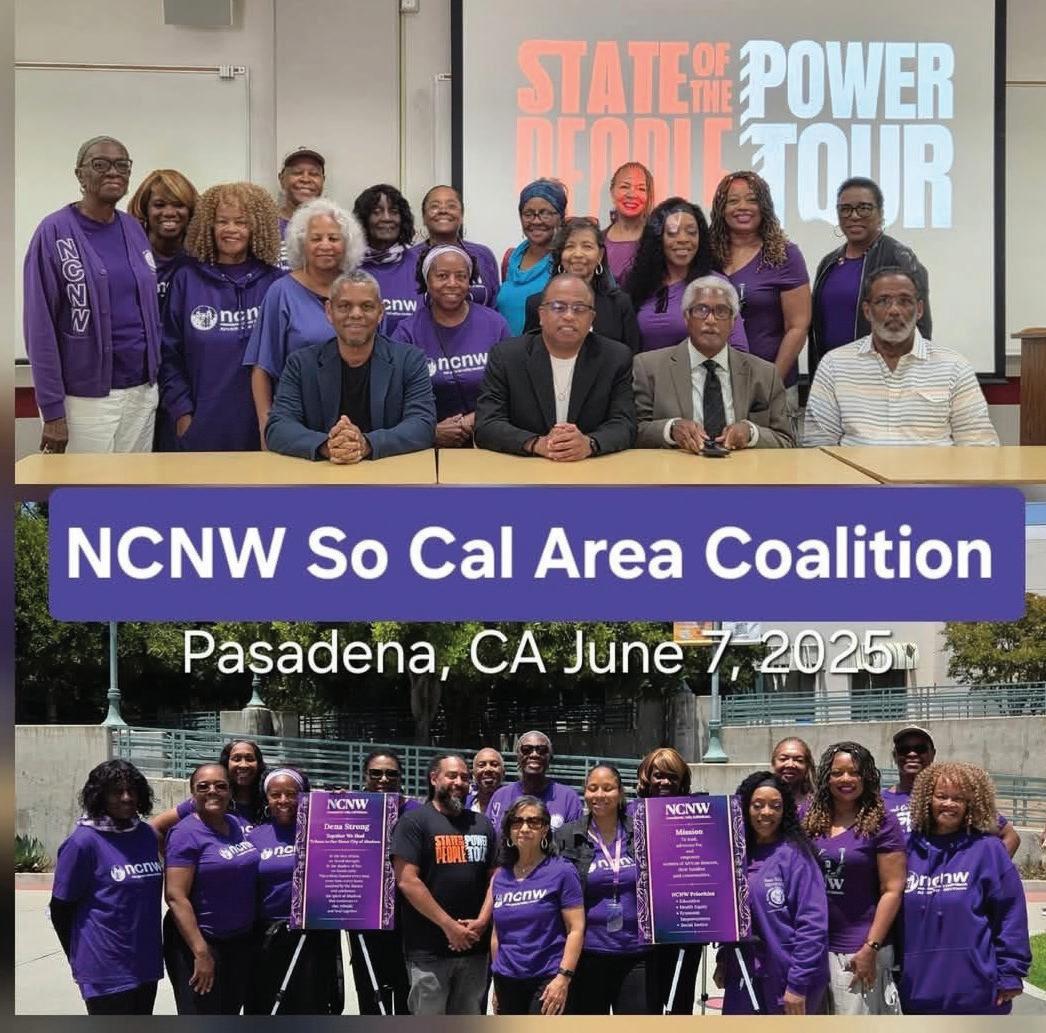
The State of the People Power Tour Visited:
• Atlanta, GA
• Durham, NC
• Montgomery, AL
• Birmingham, AL
• New Orleans, LA
• Newark, NJ
• Richmond, VA
• Detroit, MI
• Jackson, MS
• Louisville, KY
• Baltimore, MD
health is power, and showing up for each other is how we rise
Richmond
Baltimore
Atlanta
Southern California
Section and State Highlights: A Movement in Motion
These national highlights are just part of the NCNW summer story. Across the country, our sections and state coalitions carried forward the mission set by Dr. Bethune in powerful ways—hosting regional Black Family Reunions, organizing impactful state conventions, and meeting the moment in serving their communities.
From social justice activations to health equity initiatives, youth leadership, and cultural celebration, NCNW women are showing what it means to be a force for action and joy at every level of our organization.
A Legacy Moving Forward
As we reflect on this impactful summer, we are reminded that NCNW is not only preserving our rich legacy, we are writing new chapters of progress, power, and possibility. NCNW is on the move, and the movement is strong. Because of Bethune.
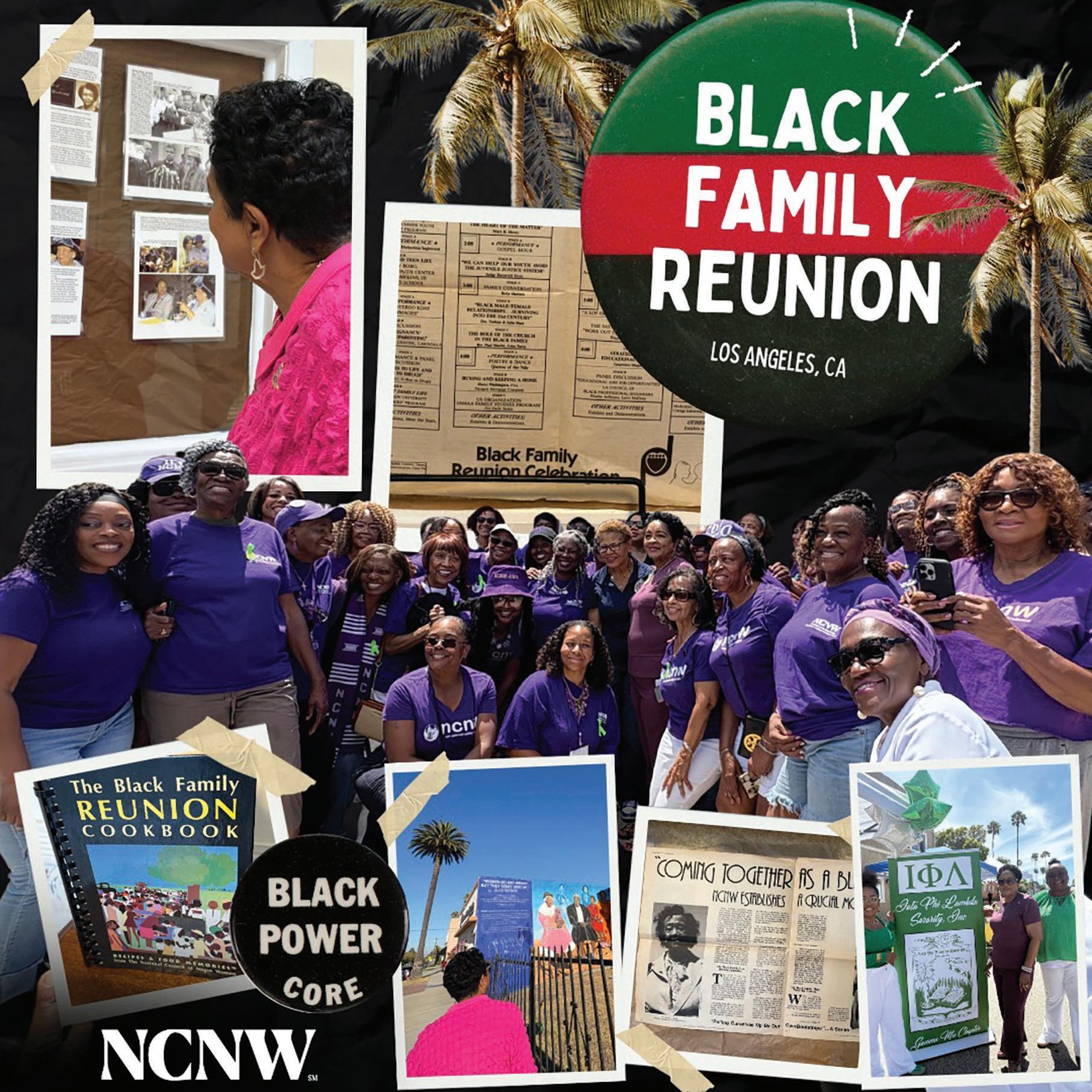
advocacy in action
In recent months, the National Council of Negro Women (NCNW) has intensified its efforts to address pressing issues affecting Black communities through advocacy, community engagement, and policy leadership.
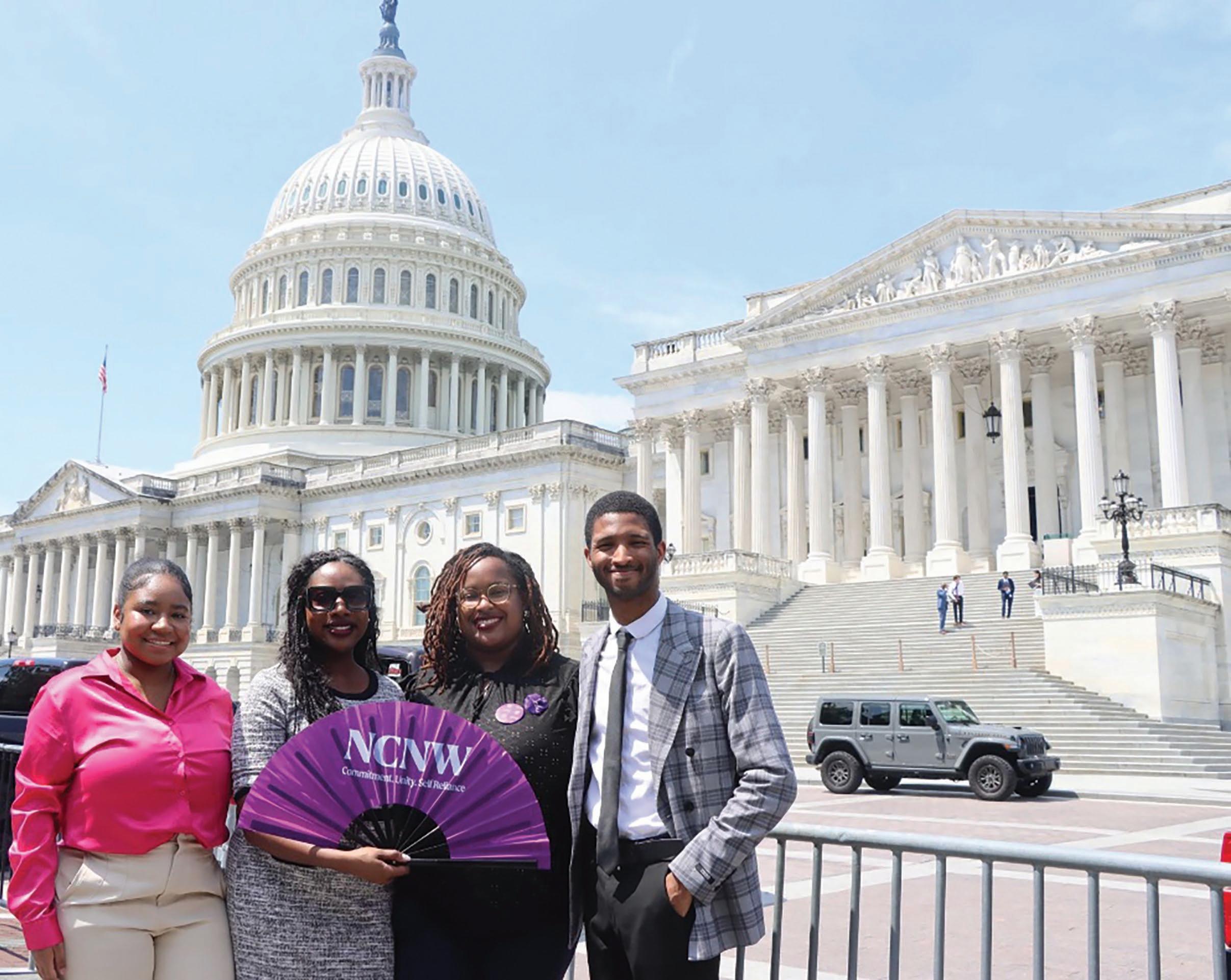
The full Advocacy and Policy Team are pictured in front of the Capitol in attendance of the reintroduction of the John R. Lewis Voting Rights Advancement Act.
Keynote speakers and panelists for our Black Women’s Equal Pay Day Briefing (from left to right): Joi Chaney, Congresswoman Alma Adams (NC-12), President & CEO Shavon Arline-Bradley, Dr. Jamila K. Taylor, and Gaylynn Burroughs. This event was the first ever NCNW-led Capitol Hill briefing.
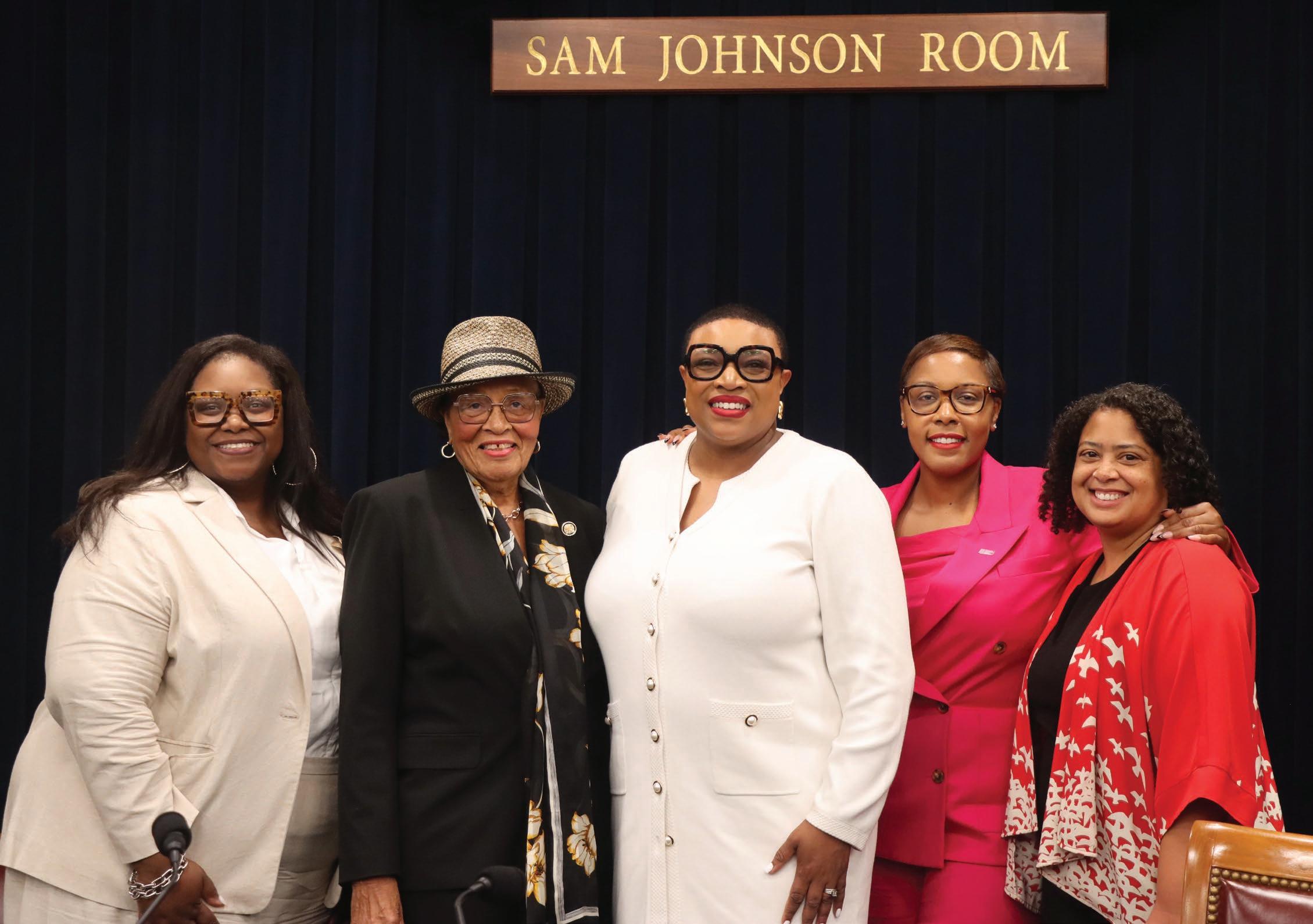
ON MAY 23, 2025, NCNW Federal and State Advocacy Managers, Tyese Williams and Micah Jumpp, attended the “Breathe Easy: Protecting Kids from Vaping” Town Hall at the Bayland Community Center in Houston, Texas. The event focused on the rising youth vaping epidemic, particularly within Black communities. Williams emphasized the NCNW commitment to advancing tobacco control policies and highlighted the importance of family and community-led prevention. The participation of all 13 Houston-area chapters of Jack and Jill of America demonstrated broad community engagement.
Public health, education, and youth leaders discussed how Black youth face disproportionate criminalization for vaping and how Big Tobacco targets underserved neighborhoods with marketing. Youth shared their experiences, emphasizing the need for honest, inclusive education and peer-led prevention programs. Community members expressed frustration over lax enforcement and skepticism of government intervention, advocating for grassroots activism and policy reform. The event reaffirmed the NCNW dedication to supporting youth-led initiatives such as mentoring through programs like YACA and empowering parents with tools to discuss vaping risks. Protecting Black youth’s health requires a coordinated effort across education, policy, and community sectors.
IN JUNE, NCNW strengthened its internal capacity by hosting its first social justice training on June 12. All section and state social justice chairs participated in sessions covering organizational operations, compliance, legal guidance, and advocacy strategies. This training reaffirmed the NCNW commitment to building leadership capacity for effective justice advocacy.
ON JULY 9, the NCNW Advocacy and Policy team organized the first ever NCNW-led Capitol Hill briefing, “Unequal Pay, Unequal Power: Black Women’s Pay Gap Crisis,” held in the Rayburn House Office Building. The session spotlighted that
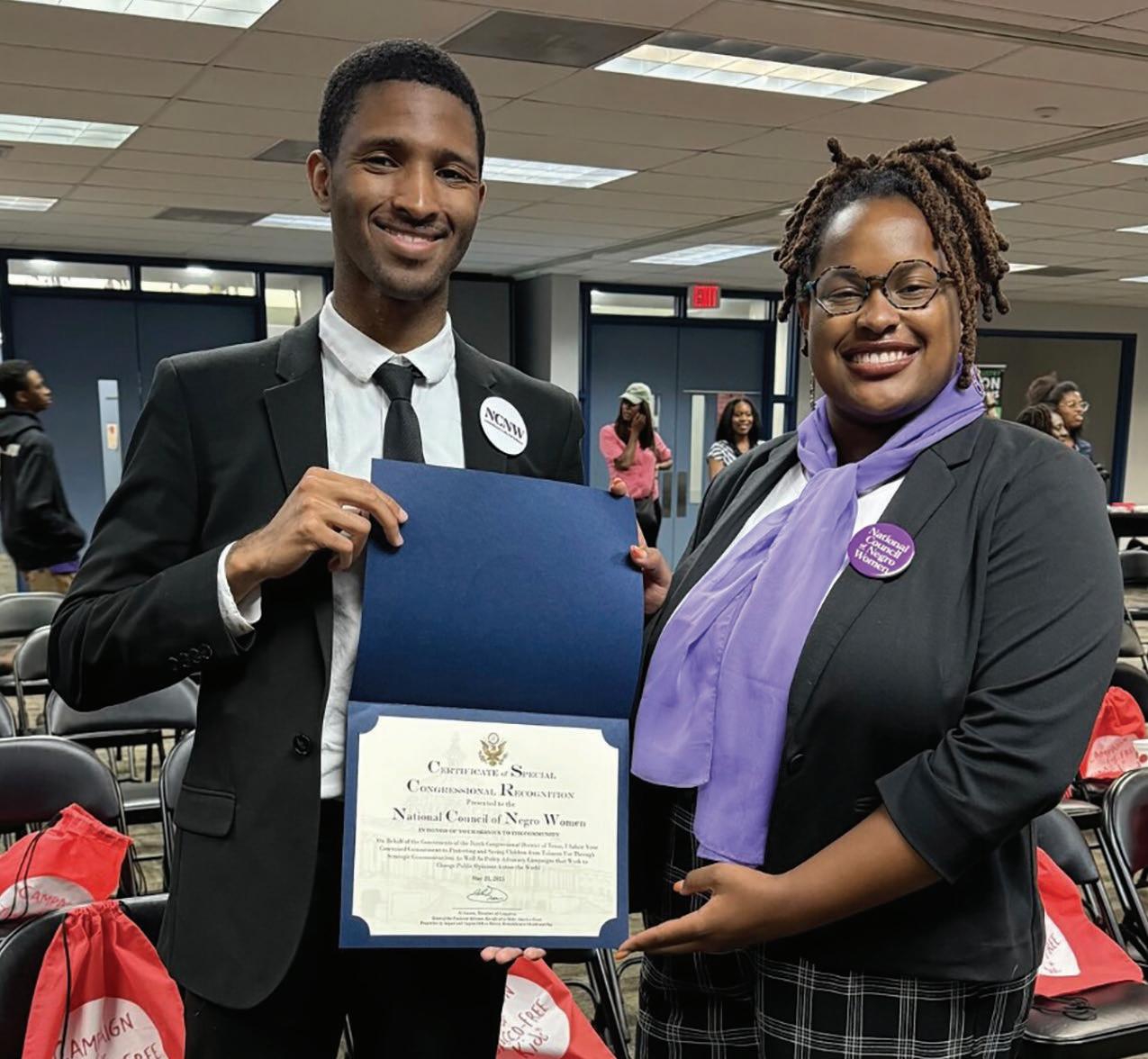
Federal and State Advocacy Managers, Tyese Williams and Micah Jumpp, respectively, pictured in Houston, Texas receiving a Certification of Special Congressional Recognition on behalf of NCNW. This award was presented by the office of Representative Al Green (TX-09).
Black women earn just 66 cents for every dollar earned by white, non-Hispanic men, exposing systemic inequalities. The briefing aimed to connect this wage gap to broader issues like workplace discrimination, underrepresentation, and limited access to childcare and family leave.
Dr. Ja’Lia Taylor, NCNW Director of Policy, Telecommunications, and Technology authored the accompanying policy brief “Unequal Pay, Unequal Power,” providing vital data and policy recommendations rooted in research and lived experience. The event reinforced the role of NCNW as a defender of Black women’s economic justice and positioned the organization as a key player in national policy debates on economic equity.
ALSO IN JULY, the NCNW policy team joined advocates on Capitol Hill for the reintroduction of the John R. Lewis Voting Rights Advancement Act (VRAA), led by Senators Dick Durbin and Raphael Warnock. This legislation aims to restore and strengthen voting rights protections, combat modern voter suppression, and ensure equitable access to the ballot for marginalized communities. The event highlighted the unwavering NCNW commitment to defending democracy and ensuring political representation.
These initiatives reflect our strategic focus on health, economic justice, and voting rights. Through community engagement, policy advocacy, and capacity building, NCNW continues to lead efforts to uplift Black communities and promote an equitable future.
The unwavering NCNW commitment to defending democracy and ensuring political representation.

Also featured with our panelists is the Advocacy and Policy Team, Tyese Williams, Dr.
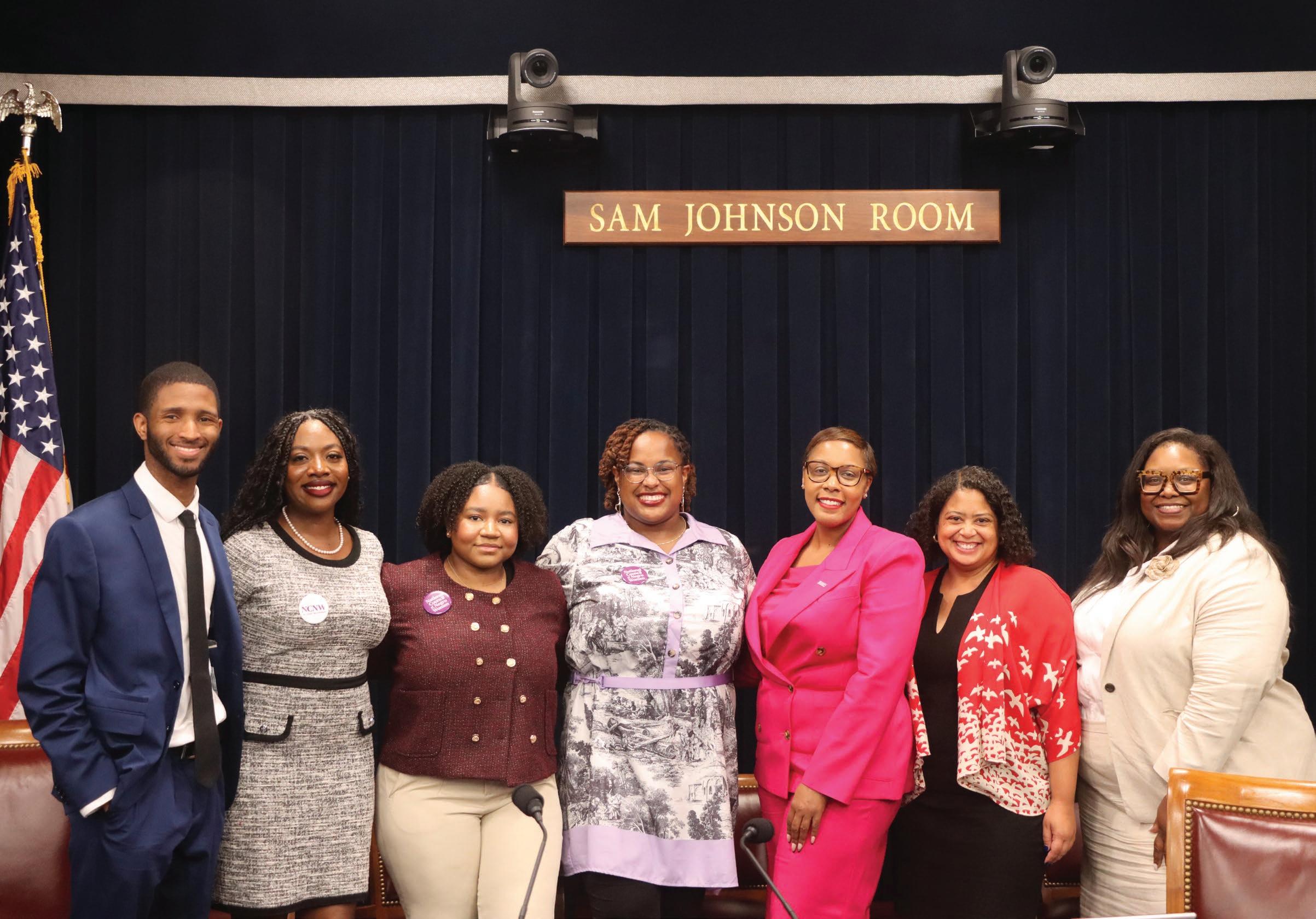
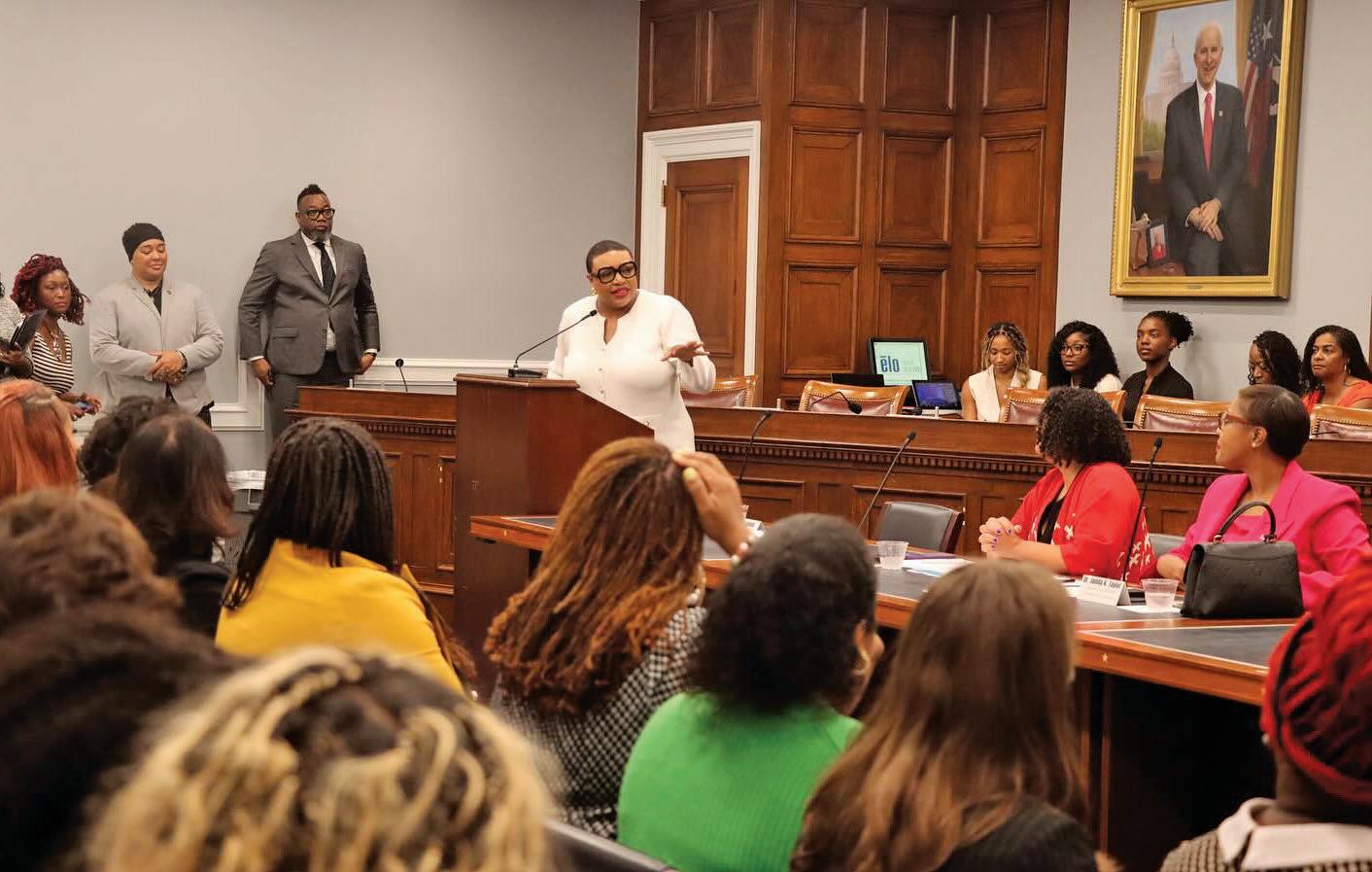

NCNW Black Women’s Equal Pay Day Briefing on Capitol Hill gathered a standing room only crowd.
Ja’Lia Taylor, Brashanda McCoy, and Micah Jumpp.

NATIONAL COMMITTEE OF YOUTH, YOUNG ADULT, AND COLLEGIATE
AFFAIRS:
BUILDING LEGACY,
BY YACA CHAIR: GABRIELLE ROGERS
The National Committee of Youth, Young Adult, and Collegiate Affairs continues to advance the vision of NCNW by empowering the next generation of leaders while honoring the wisdom of those who paved the way. Our work is rooted in intergenerational connection, authentic engagement, and programs that create pathways for young women to thrive.
Legacy Intergenerational Pairing Program
One of newest signature initiatives, the Legacy Intergenerational Pairing Program, officially launching this year to strengthen bonds between seasoned NCNW members and emerging leaders. This program pairs young adults with experienced mentors, ensuring that our legacy of service, advocacy, and sisterhood is not only preserved but actively nurtured.

Youth Section Survey
To ensure that we are meeting the needs of our youth members, the committee conducted a Youth Section Survey. The results are guiding our national strategy to provide programming that reflects the voices, aspirations, and challenges of young women across the country. The survey highlighted priorities such as leadership training, mentorship opportunities, professional development, and spaces for advocacy. These findings will directly inform our upcoming initiatives.
LEADERSHIP, AND SISTERHOOD
First Friday: Connection and Celebration
We also launched First Friday, a monthly virtual gathering designed to build sisterhood across sections. These evenings are filled with fellowship, joy, and meaningful conversations. From fun games to themed discussions, First Friday has become a space where young adults, and collegiates can come together to celebrate one another and stay connected to NCNW’s mission in a way that is both engaging and refreshing.


Through these initiatives, the National Committee of Youth, Young Adult, and Collegiate Affairs is making intentional strides to amplify young voices, honor legacy, and strengthen the fabric of NCNW. Together, we are ensuring that our future is both rooted and rising.


This is a “flashback” article, originally featured in the Summer 2020 issue of SISTERS. This feature highlights the ongoing importance of NCNW economic empowerment work. Read on to learn more about current economic empowerment service with the project RISE program.
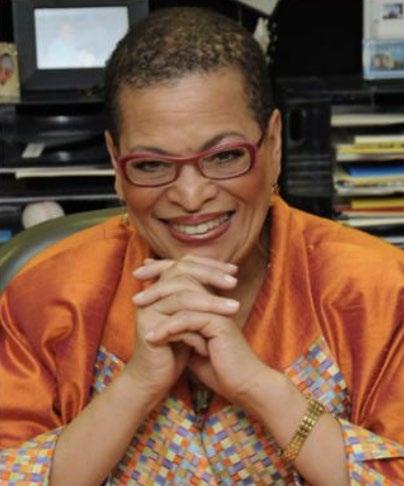
THE COMING CRISIS IN FOOD PRICES
BY DR. JULIANNE MALVEAUX
Food prices started rising in April, and they are expected to continue to go up until September. The coronavirus is partly responsible for the increased cost of milk and meat since farmers could not maintain social distancing and produce their products. Millions of pigs were “euthanized” because meat processing plants were closed because of the coronavirus. Hundreds of thousands of gallons of milk had to be discarded because of Coronavirus-related distribution prices. Thus, food shoppers are seeing prices of some products rising sharply, with the highest increases occurring in meat, poultry, fish and eggs.
Ironically, food prices are rising while prices in other sectors are falling, but people’s demand for food is “demand inelastic,” which means that no matter what is going on in the economy, people will still buy food. Rising prices hit those with low and moderate incomes harder than others. Higher prices will also put pressure on food banks, who managed extremely high demand during the coronavirus’s worst days. Needy families waited for hour in long lines for a bag of food, which is ironic given all the discarded milk and pork that could have fed thousands.
Restaurant prices are likely to rise, as well. Most restaurants will practice social distancing and operate at between 25 and 50 percent of capacity. Few will break even, and the Independent Restaurant Association has asked for $120 billion for assistance. Even moderately priced and fast food restaurants are likely to see price hikes.
These rising prices will hit the food insecure hardest. In 2018, when the last data was available, 37 million people were food insecure, including 11 million children. In June 2020, I conservatively estimate 47 million are food insecure, including 18 million children. Those numbers will down as go we recover from corona, but we will see rising food prices through September, and perhaps through the end of the year. (for more information about food insecurity, check out the website www.feedingamerica.org).




You may not be affected by rising food prices, but you can be mindful of those who are. You can give time and money to food banks, encourage your sorority, NCNW section, or church to establish or expand its food program, or embrace a neighbor security for all. who is experiencing food challenges. You’d be surprised. Some folks who look good are struggling. Lend a hand.

FLASH BACK
If you are affected by rising food prices, remember that Black women know how to make a dollar stretch, and if you are affected by increasing costs, use some of that “mother wit” that our foremothers had. Do recipe substitutions, shop the sales, and clip the coupons. The wholesale discount clubs you have (Costco, Sam’s Club) usually have terrific prices, but if a small household, you won’t necessarily want 24 cartons of yogurt or 18 croissants. Share! Go in with a friend and split some of the larger items. Freeze! Explore every option.
Help others, budget yourself, and equally importantly, you must raise your voice in the policy space about food insecurity, outright hunger, and the skewed national priorities that, in this “land of plenty,” folks to go hungry. Write your congressional representative and share your concern about rising food prices.
Is your representative on the House Agriculture Committee? You can find out here -- https:// agriculture.house. gov/about/members.htm.
The Federal Reserve Bank sees us recovering, but slowly. Unemployment rates won’t return to their pre-COVID levels until mid-2023. Food is a necessity, and rising food prices are troubling, especially the way they will affect folks at the bottom. Women of conscience must be advocates for food security for all.
The views and opinions expressed here are those of the author and do not necessarily reflect the official policy or position of the National Council of Negro Women, Inc. Any content provided by the author is her opinion, and are not intended to malign any religion, ethnic group, club, organization, company, individual or anyone or anything.
RISE: Empowering Black Women to Build Wealth
NCNW recently launched RISE: Resources for Investment, Savings, and Economic Empowerment—a bold new financial literacy program designed to help close the racial wealth gap for African American women and their families. This program is hosted by Bank of America.
RISE is more than a program; it’s a promise. By delivering culturally relevant financial education, creating safe spaces for honest financial conversations, and providing tools for sustainable wealth-building, NCNW is advancing economic empowerment across generations. The program’s curriculum spans every life stage—from young adults to seniors—and includes modules on budgeting, credit building, debt reduction, saving, investing, and legacy planning.
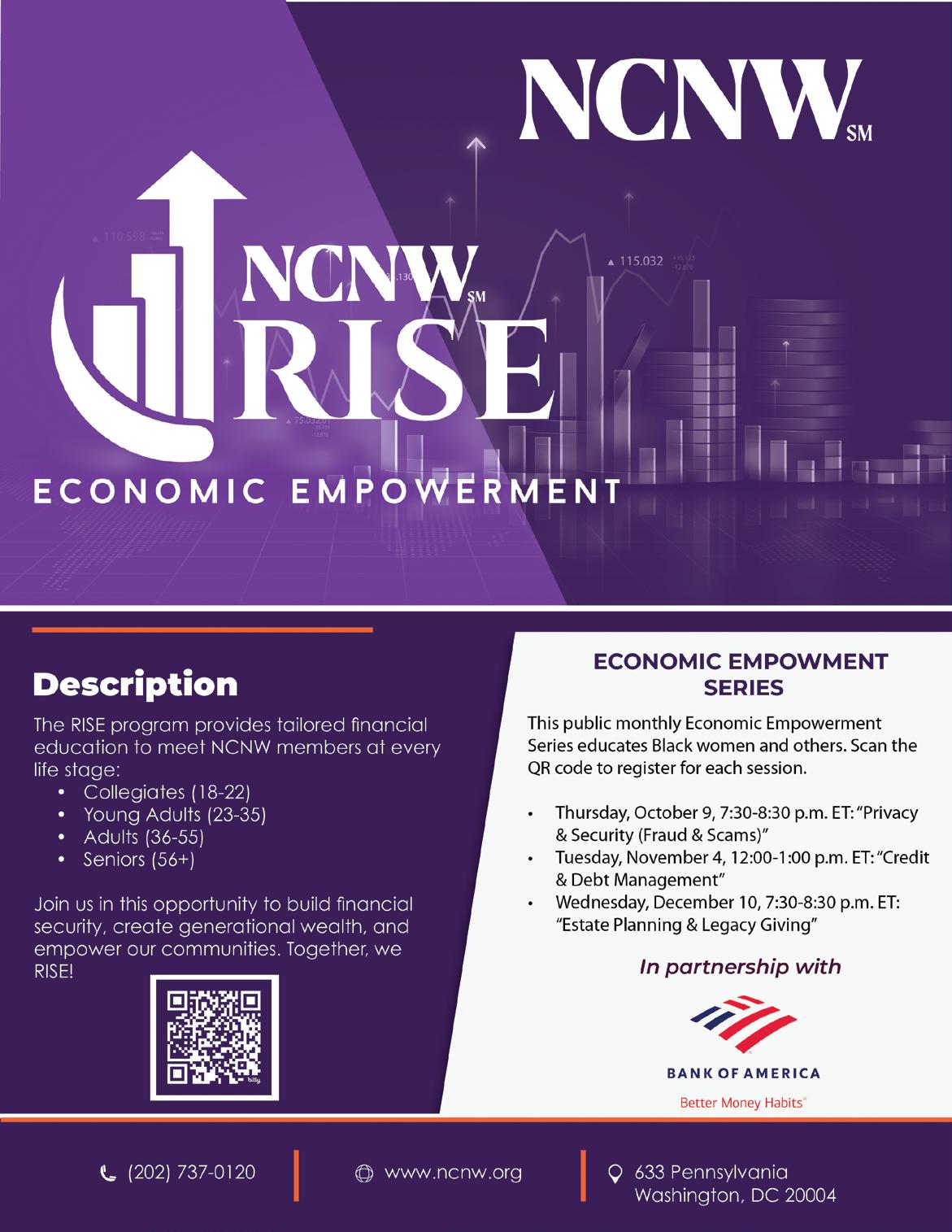
“Black women have historically been locked out of wealth-building opportunities. RISE is our commitment to breaking that cycle and empowering women with the knowledge, skills, and support they need to thrive financially,” said Shavon Arline-Bradley, NCNW President and CEO.
A Strong Launch with Immediate Impact
The public launch event, the Intro to Financial Literacy & Economic Mobility webinar, drew more than 1,000 registrants from 35 states. The response was overwhelmingly positive:
• 85% rated the facilitation Excellent.
• 73% said the session was extremely valuable for personal and professional growth.
• 63% reported leaving the webinar very confident in their ability to immediately implement budgeting and savings strategies.
Participants also shared inspiring feedback:
• “During the webinar I confidently scheduled automatic bi-weekly payments from my checking to my savings account.”
• “Although I was familiar with budgeting, I failed to apply it. This webinar made me realize the importance of putting my expenses and income on paper.”
What’s Next: The Economic Empowerment Series
Building on this momentum, NCNW will continue hosting the Economic Empowerment Series, a monthly webinar series open to the public. Upcoming topics include:
• Oct. 9, 7:30 p.m. ET: Privacy and Security (Fraud and Scams)
• Nov. 4, 12:00 p.m. ET: Credit and Debt Management
• Dec. 10, 7:30 p.m. ET: Estate Planning & Legacy Giving
Click the QR code or visit https://ncnw.org/project/ rise/ to learn more and register.


Spotlight on Health: Stronger Together This Respiratory Season
BY DR. SYNOVIA MOSS, GHW NATIONAL PROJECT MANAGER
As cooler months arrive, so does respiratory season—a time when COVID-19, flu, and RSV circulate more widely. For African American families, these illnesses can carry serious risks, but they are also preventable. The Good Health WINs (Women’s Immunization Network) initiative, led by NCNW and supported by partners across the country, is working to ensure our communities are equipped with the tools to stay healthy. We know that prevention is powerful, and vaccines remain one of the most effective ways to reduce severe illness and hospitalization from these respiratory diseases.
Kortnee Cooper, MD, GHW’s Project Manager for Sigma Gamma Rho, explains, “Every year, we see a spike in COVID-19, flu, and RSV cases. For our community— where conditions like diabetes, asthma, and heart disease are more common—these viruses can be especially dangerous. This season is our chance to get ahead and stay healthy.”
How is Good Health WINs making an impact?
More than 1,084 local NCNW sections, affiliate partners, and Divine Nine chapters are actively working to build vaccine confidence, hosting health forums, sharing resources, and answering questions in safe, supportive environments. Every story matters—when one sister shares her reason for getting vaccinated, she encourages others.
Prevention is an act of love. Simple steps like handwashing, staying home when you’re sick, wearing a mask if you feel under the weather, and keeping up with

recommended vaccines can make all the difference. Dr. Mary McLeod Bethune taught us that our service must be rooted in wisdom and courage—this season, we can embody that by putting health at the center of our families and communities.”
Together, Good Health WINs reminds us that when we protect each other, we win.
QR Code for GHWs National Handwashing Toolkit

NCNW Launches Second Cohort of Bethune-Height Changemaker Pathways
This August, NCNW launched the second cohort of our Bethune-Height Changemaker Pathways (BHCP) program. Named in honor of our legendary founder Dr. Mary McLeod Bethune and President Emerita Dr. Dorothy I. Height, the BHCP program builds on NCNW’s enduring legacy of preparing women to lead with courage, vision, and purpose. BHCP Collegiate Career Accelerator participants earn a yearlong experience including professional development, mentorship, and a $5,000 stipend.
“BHCP is one way NCNW is creating space for young women who should be in the room where forward change is cultivated,” said NCNW President and CEO Shavon Arline-Bradley. “This program creates an opportunity for Black women to change their personal and professional trajectory, and that of their community.”
Another exciting feature of the program includes the opportunity for participants to facilitate NCNW’s GirlCon, our trendsetting national leadership and empowerment summit for middle- and high-school girls.
“This second cohort will maximize the impact established by our inaugural class,” President Arline-Bradley added.
Meet the 2025–2026 Rising Changemakers
• Cameron Glymph, English and Political Science, Florida State University
• Haleigh Ferguson, Business Administration, Florida Agricultural and Mechanical University
• J’Meeyah White, Kinesiology and Chemistry, Louisiana State University
• Laci White, Business Administration and Sport Administration, University of Louisville
• Samauria Eason, Biology, Xavier University of Louisiana
• Treesta James, Biomedical Engineering, The George Washington University
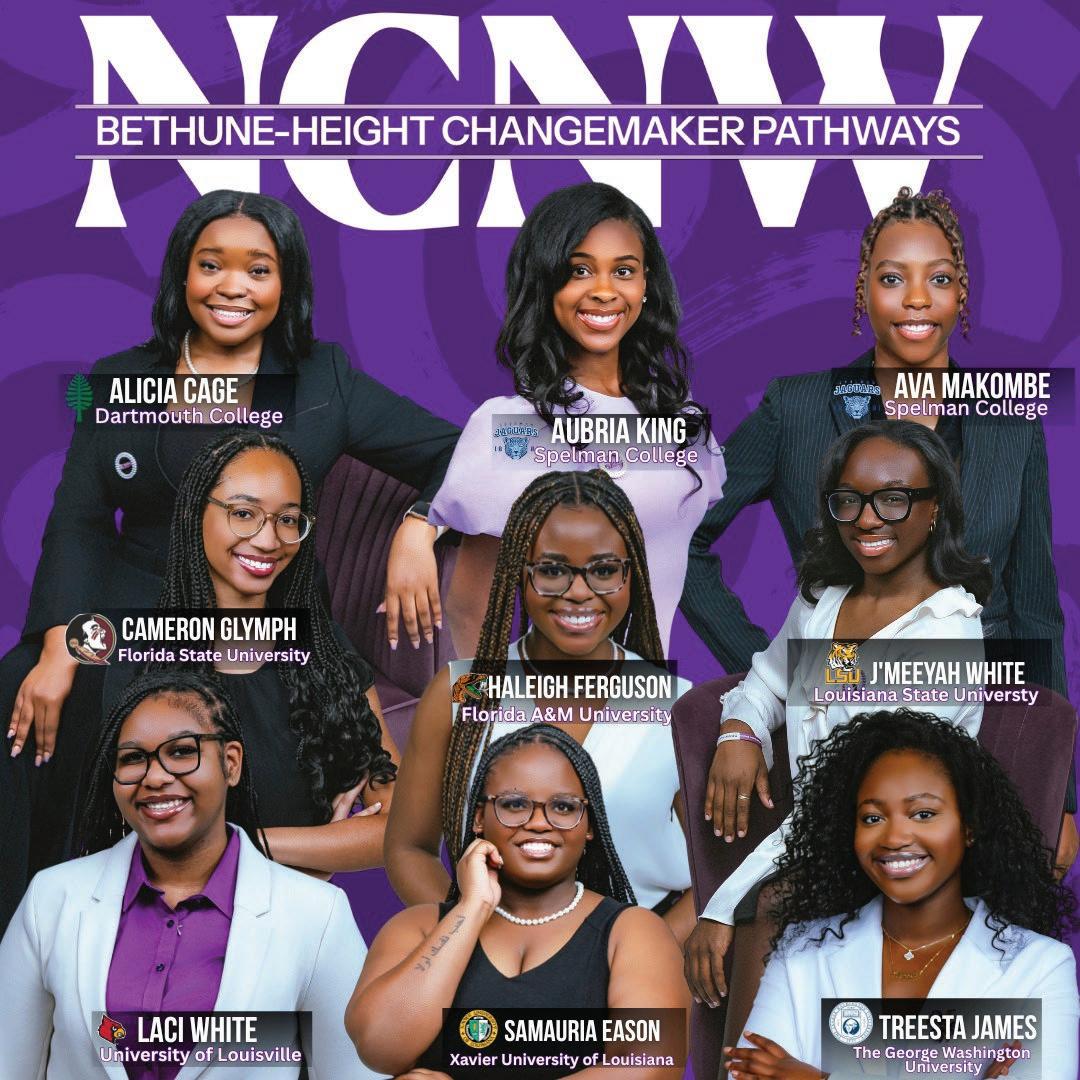
Looking Ahead
The new class of Rising Changemakers represents excellence across STEM, business, and liberal arts majors at Historically Black Colleges and Universities, Ivy League institutions, and a wide range of colleges across the nation.
• Alicia Cage, Biochemistry, Dartmouth College
• Aubria King, Biology, Spelman College
• Ava Makombe, Psychology, Spelman College
Congratulations to the 2025–2026 class of Rising Changemakers! These dynamic young women embody NCNW’s mission and will carry forward the vision of Dr. Bethune and Dr. Height by using their education, leadership, and passion to inspire lasting change.
With BHCP, NCNW is not only breaking down barriers— we are building pathways for young Black women to lead, thrive, and transform their communities.
NCNW-Colgate Partnership Mobile Dental Van
The Fayetteville Area Section (NC) welcomed the Colgate Mobile Dental Van, offering free dental checkups to children in the community. This was a great way to kick off the school year with bright smiles and healthy habits.
Why Oral Health Matters to Our Communities
Oral health is a critical but often overlooked component of overall wellness in our communities:
• African American children are twice as likely to have untreated tooth decay compared to their white peers
• More than 80% of tooth decay in children from lower-income families goes untreated
• Poor oral health is linked to chronic conditions including heart disease, diabetes, and pregnancy complications
• Children with dental pain miss more than 51 million school hours annually, affecting educational outcomes
As NCNW leaders, you have the power to change these statistics by bringing vital dental resources directly to those who need them most.
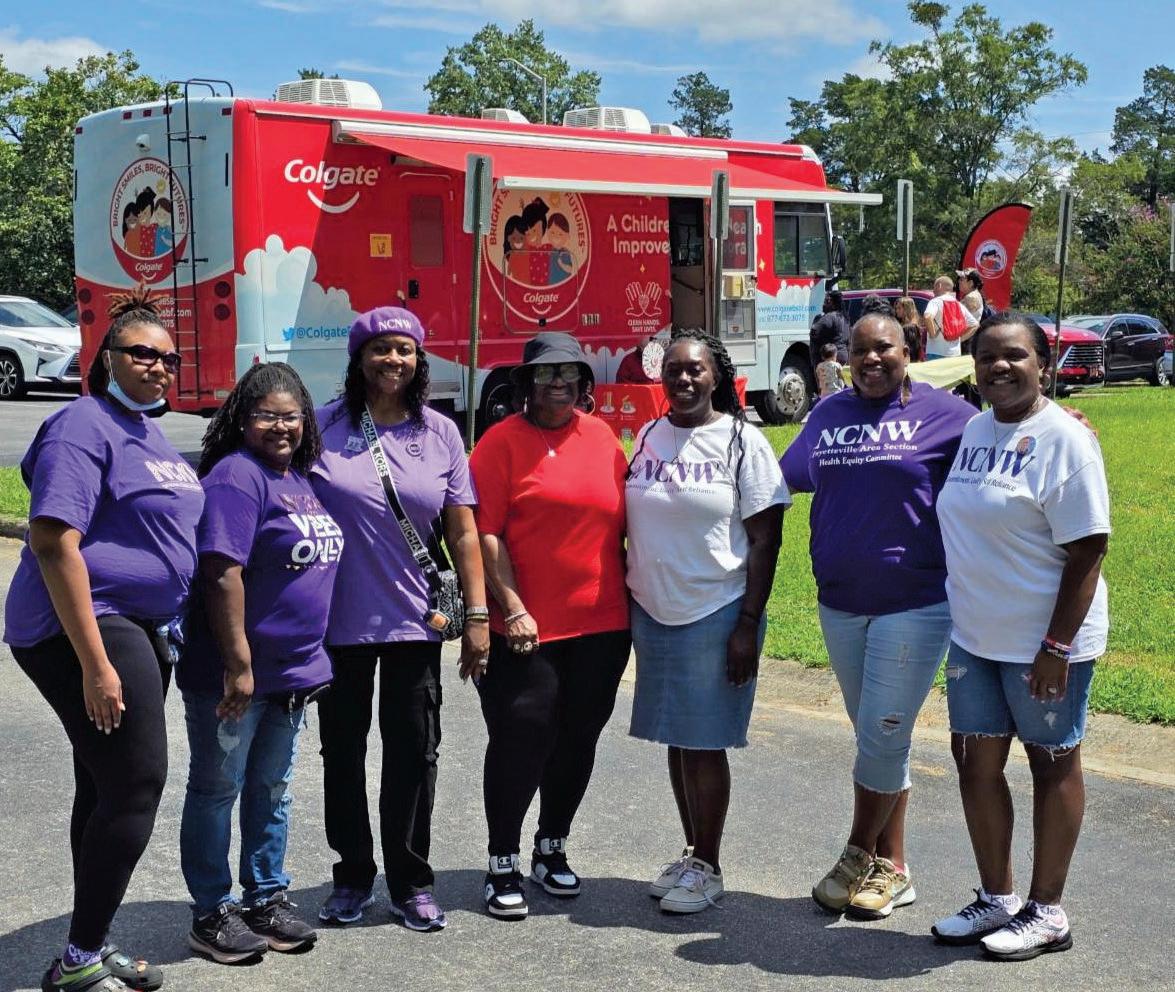
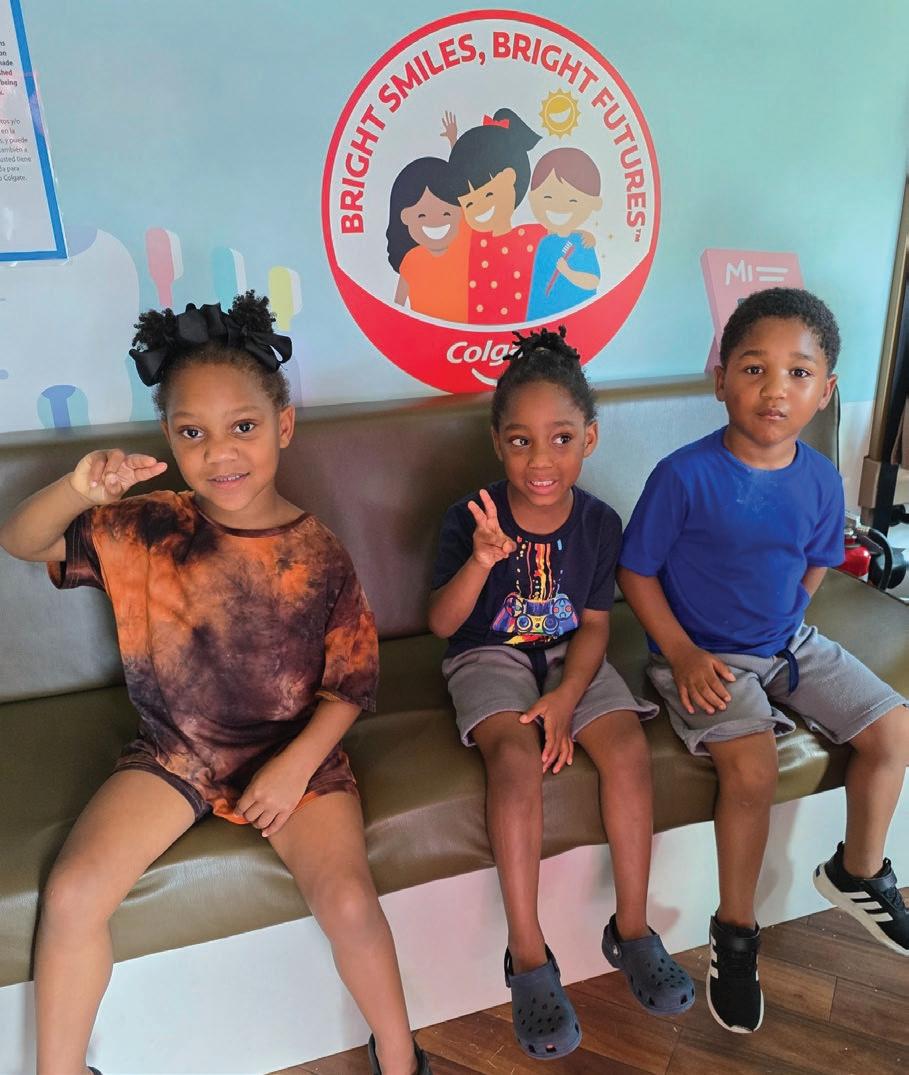
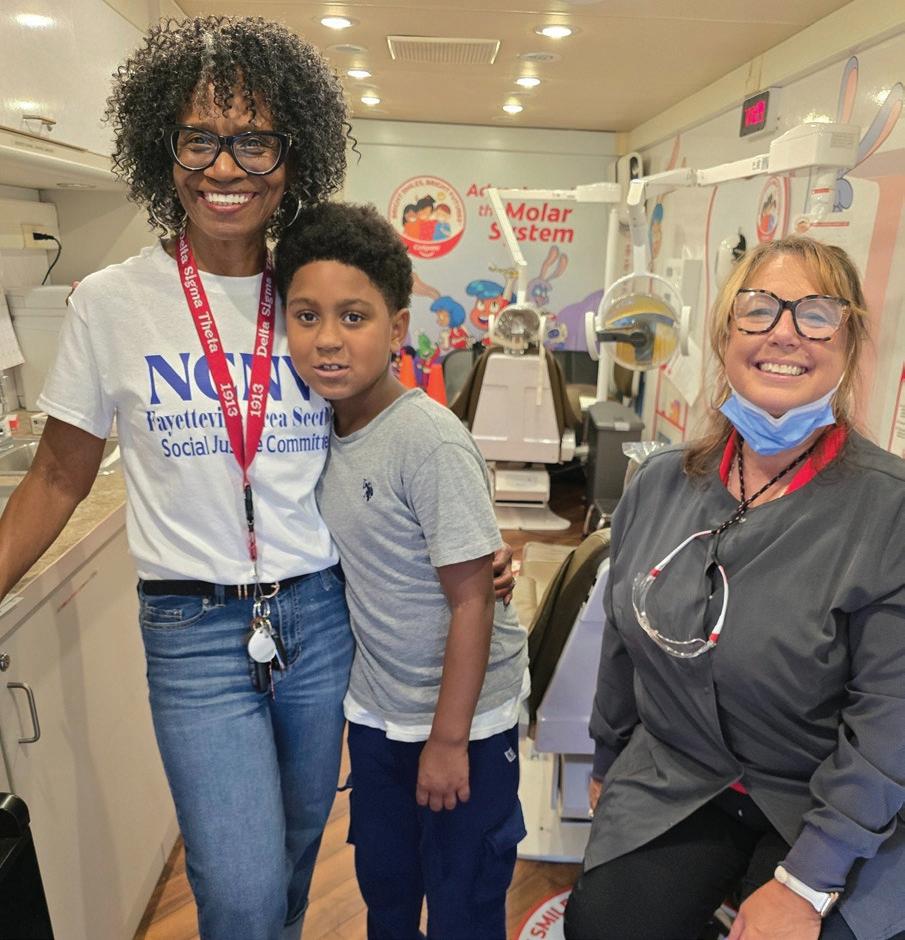

We are thrilled to highlight Tanetra Barrett, a dedicated member and proud supporter of our President’s Circle.
A military veteran originally from Marshville, North Carolina, Tanetra carries with her the values of community, resilience, and service that shaped her early life. Much of that foundation was laid by her late father, whose influence continues to guide her leadership today. “My dad always reminded me that ‘mistakes are not failures. Quitting is the true failure.’ Those words taught me perseverance, resilience, and the importance of showing up with integrity, even in difficult moments.” Watching his strength, humility, and unwavering commitment to doing right by others instilled in her a lifelong responsibility to lead with service at the center.
leaders together to both learn and lead. “I saw in NCNW a reflection of my own values: faith, service, and a commitment to empowering communities,” she shares.

That call to service drew her to NCNW, where she was moved by the organization’s ability to bridge generations, bringing seasoned trailblazers and younger
Today, Tanetra is a proud member of the President’s Circle, an experience she describes as both an honor and a responsibility. “To me, this financial commitment is an investment in the future, an act of faith that ensures NCNW has the resources to expand its reach, develop leaders, and address the pressing issues facing our communities.” She is equally passionate about inviting others to join, noting that bringing others into the Circle multiplies our collective impact and ensures the work continues with even more passion and strength.
Looking ahead, Tanetra is most excited about NCNW’s ability to equip young women and collegiate leaders to step boldly into positions of influence. “What excites me most is knowing that we are preparing the next generation to carry the torch with confidence, courage, and vision.”

Tanetra Barrett
State of Black Ohio Forum
Held in Springfield
SPRINGFIELD, OH - State legislators, community leaders and local residents gathered in Springfield on August 21 for the State of Black Ohio Town Hall, an event focused on issues impacting African American communities across the state.
Hosted by the National Council of Negro Women (NCNW) Clark County, Springfield section in partnership with the Ohio Legislative Black Caucus (OLBC), the town hall featured panel discussions on education, healthcare, economic opportunity and criminal justice reform.
Members of the OLBC highlighted both progress and persistent disparities, stressing the importance of community engagement in shaping public policy.
Panelist Rep. Meredith Lawson- Rowe said, “The big idea behind the State of Black Ohio town halls is to bring the conversation to places like Springfield- where
North Shore Section of NCNW Makes History with Intergenerational Chartering in Evanston, Illinois
With hearts full, voices lifted, and a legacy unfolding, the North Shore Section of the National Council of Negro Women was officially chartered on Saturday, June 7, 2025, at the Unitarian Church of Evanston. This powerful celebration of sisterhood and service was led by National Chair of the Board, Dr. A. Lois Keith, and marked the start of a bold new chapter of advocacy, empowerment, and community uplift across Chicago’s North Shore.
What made the day even more historic was the remarkable age range of the chartering members—spanning from just 7 years old to over 80—a true reflection of the NCNW commitment to intergenerational leadership. From seasoned elders to brighteyed children, the North Shore Section stands as a vibrant example of what it
SECTION NEWS
our caucus currently has no representation. This town hall created a forum for civic engagement at the state level, from understanding the State Budget to learning how to track and follow legislative bills.”
Audience members were invited to ask questions and share perspectives, fostering a dialogue between state policymakers and local residents. Organizers described the event as timely, citing ongoing debates at both the state and national level regarding equity and access.
NCNW Clark County Springfield section VicePresident Debbie Woods said the forum underscored the organization’s commitment to advancing civic partnership. “Our goal is to create a platform where voices from our community are heard and connected to decision- makers who can influence change,” she said.
The town hall concluded with a call for collaboration between state officials and local communities. The sections Social Justice committee is currently planning follow- up initiatives to build on the discussions and strengthen partnerships across the region.
means to honor the past, serve the present, and invest in the future.
The section, led by President Ella Whitehead, was honored to receive an official Proclamation from Evanston Mayor Daniel Biss and a Resolution from Cook County Commissioner Josina Morita, both recognizing the significance of the chartering and the section’s commitment to uplifting Black women and their families.
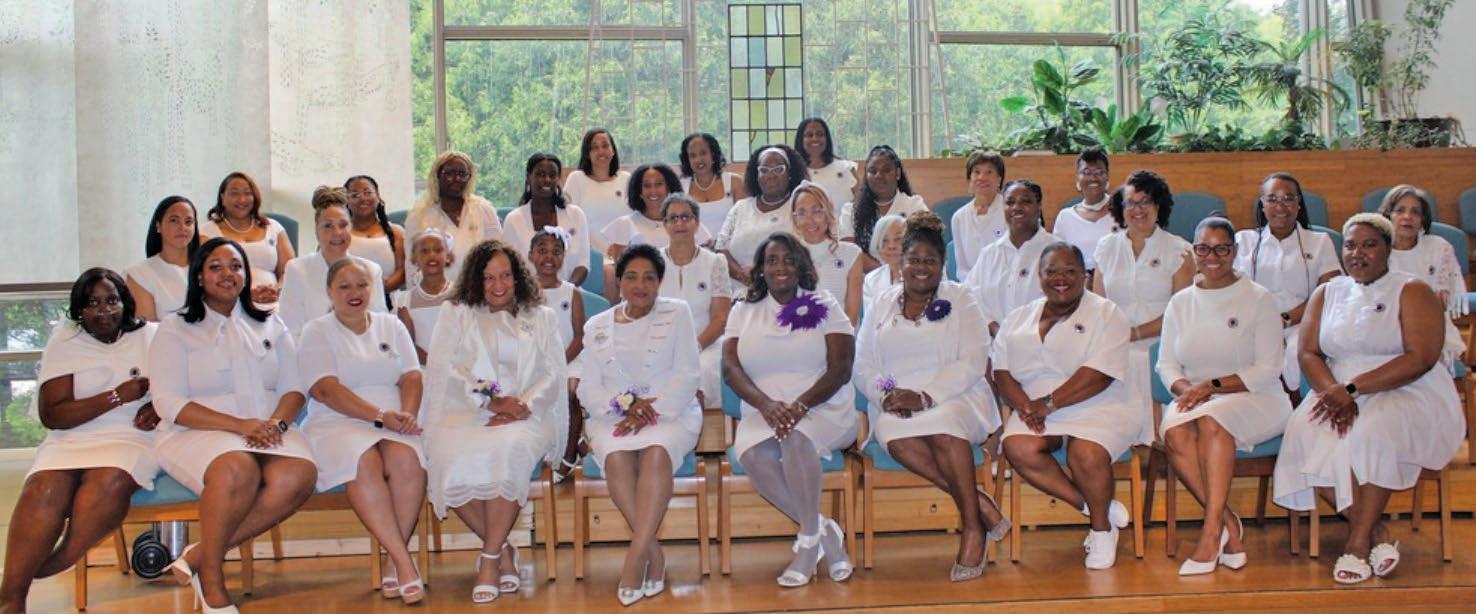
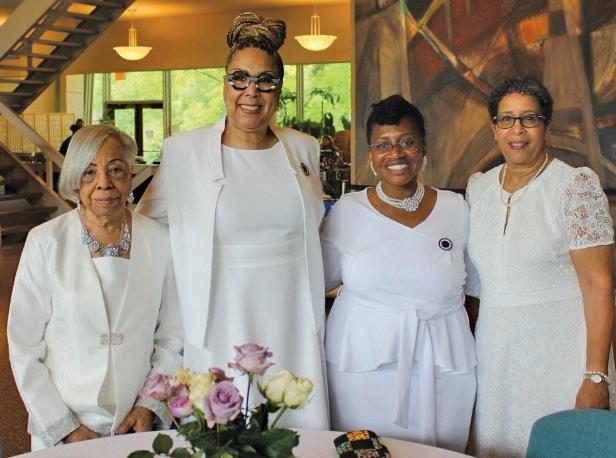
The ceremony drew an impressive crowd of supporters and dignitaries, including Dr. Ramona James, Acting President of the NCNW Illinois State Coalition, Regina Majors, National NCNW Membership Chair, and Karen Davis, President of the Chicago Central Section. They were joined by a host of elected and appointed officials from across the North Shore, including library trustees, school board members, park and recreation commissioners, and local city council members, who came out in full support.
GREATER ATLANTA SECTION (GA)
The sisters of the NCNW Greater Atlanta (GA) proudly supported the Brooke Haven Police Department’s National Night Out to give back to the community. Together, they distributed school supplies to local students, helping families prepare for a successful school year.
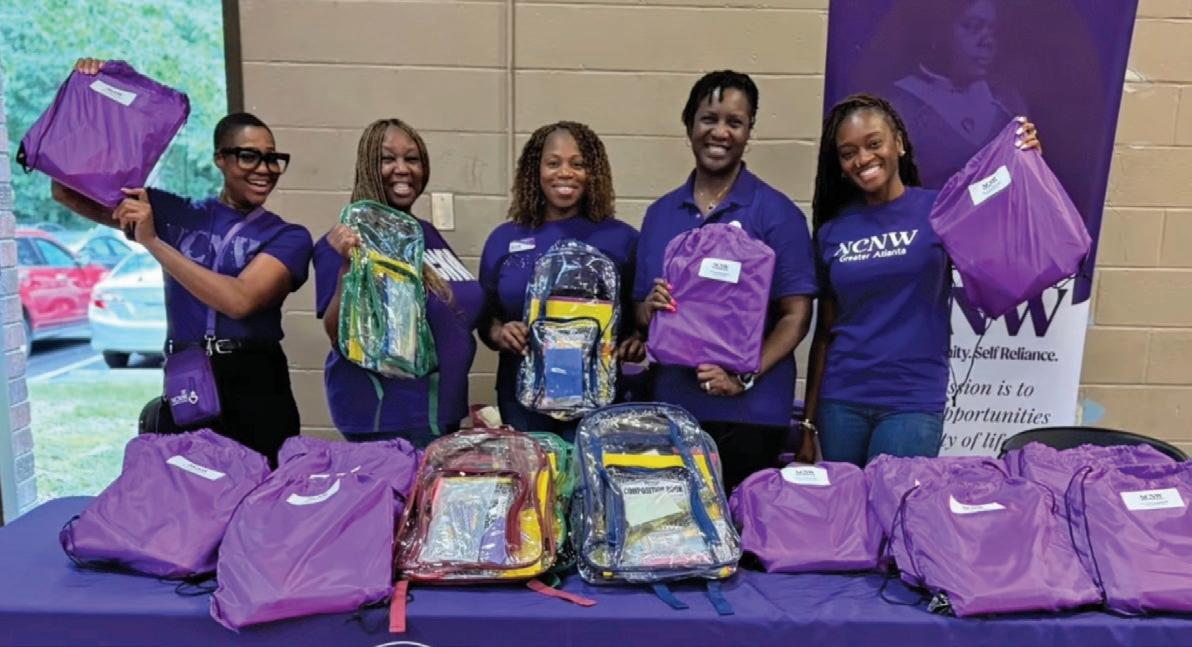
To cap off a weekend of celebration and service, the section gathered on Sunday morning at Sherman United Methodist Church—a historic Evanston congregation founded in 1922 by Mrs. Lula B. Sherman, an African American woman and visionary community leader. Surrounded by love, faith, and community, members stood together at the altar and received a special prayer of blessing over their work ahead. It was a fitting and soulful close to a weekend rooted in faith, unity, and a deep commitment to carrying the NCNW mission forward.
In her address, President Whitehead reminded attendees of the larger meaning behind the moment: “We come not as individuals, but as a collective—grounded in service, united in sisterhood, and committed to change.”
The chartering of the North Shore Section was a moment of quiet power and deep purpose—bringing together generations in service, grounded in the legacy of Black women who have long led with faith, dignity, and resolve. It marked not just a beginning, but a continuation of sacred work.
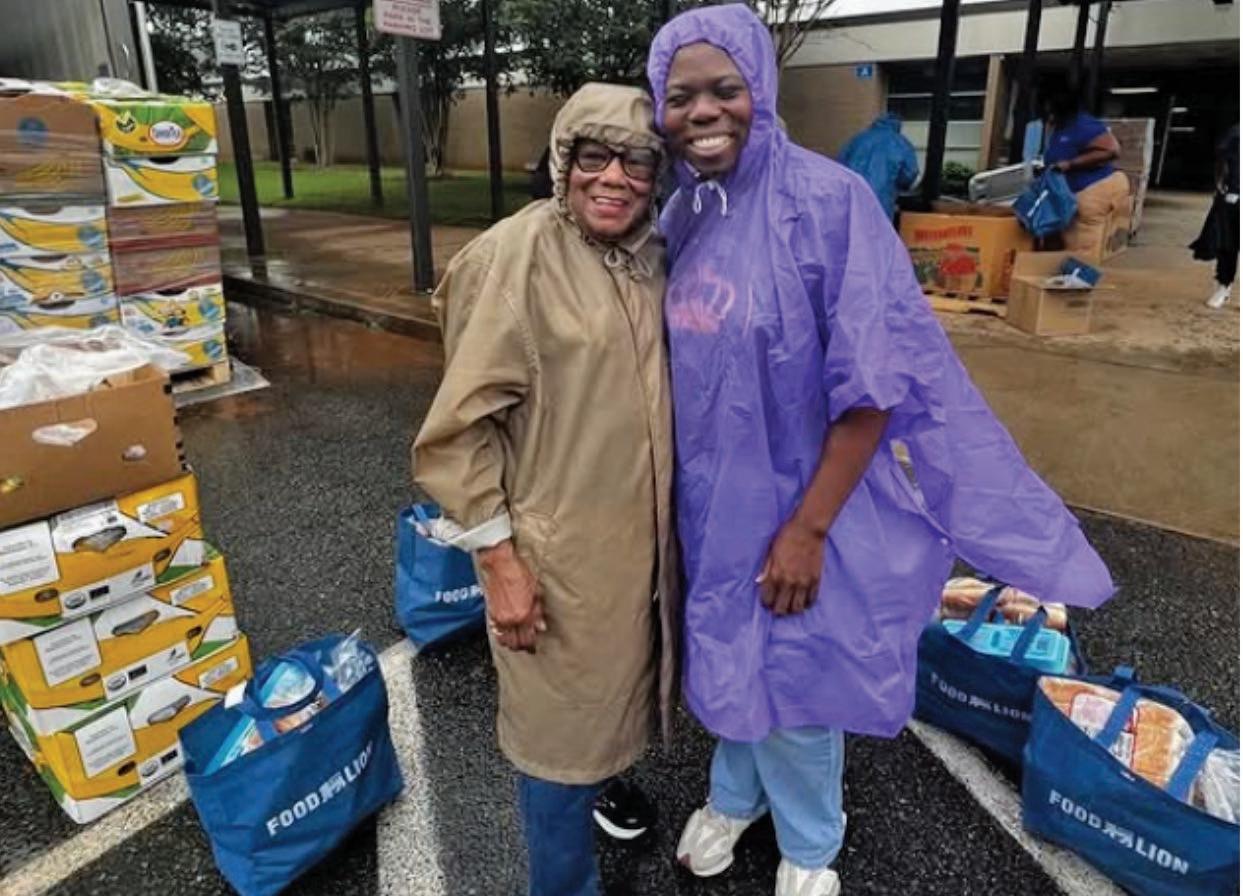
CHARLOTTE SECTION (NC)
The NCNW Charlotte Section (NC) proudly served its community by volunteering at Albemarle Road Elementary School’s Mobile Food Pantry. Members helped distribute nutritious meals to families, ensuring children had access to healthy food and support outside the classroom.
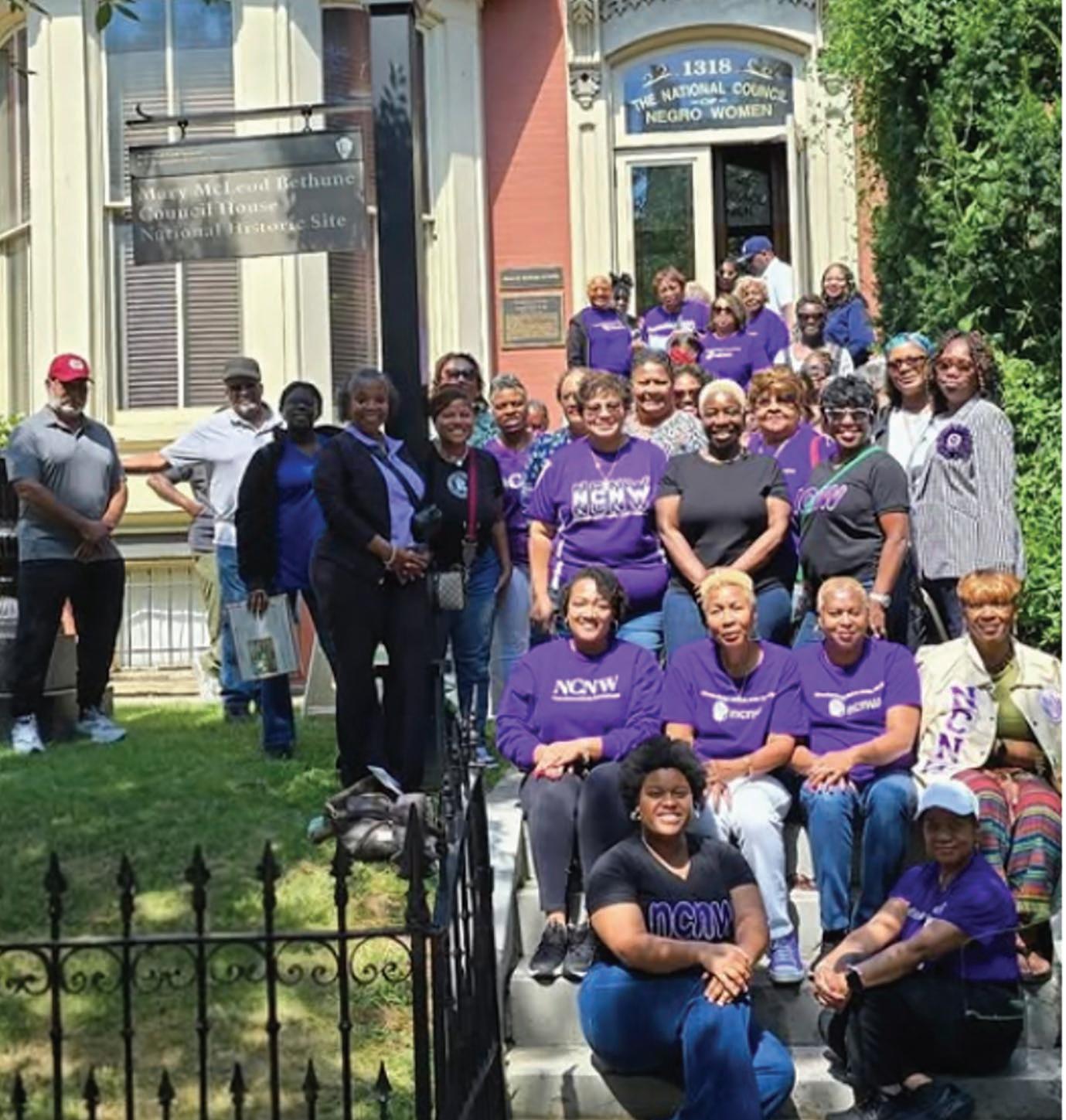
CHESTERFIELD METRO SECTION (VA)
The Chesterfield (VA) Metro Section visited Washington, DC, exploring key sites that celebrate Black history and legacy. Members toured the Historic Bethune Council House, the National Museum of African American History, and the Mary McLeod Bethune Memorial in Lincoln Park.
CLEVELAND SECTION (OH)
The Cleveland Section of NCNW (OH) visited the Ohio State House in Columbus to support Senate Bill 178, which calls for a task force to address missing and murdered women and girls of color. The task force will partner with state agencies to create policy changes that promote care and accountability. Senator Paula HicksHudson invited the section in recognition of their advocacy through the NCN Missing Women and Children, Human and Sex Trafficking Awareness and Safety Series initiative.
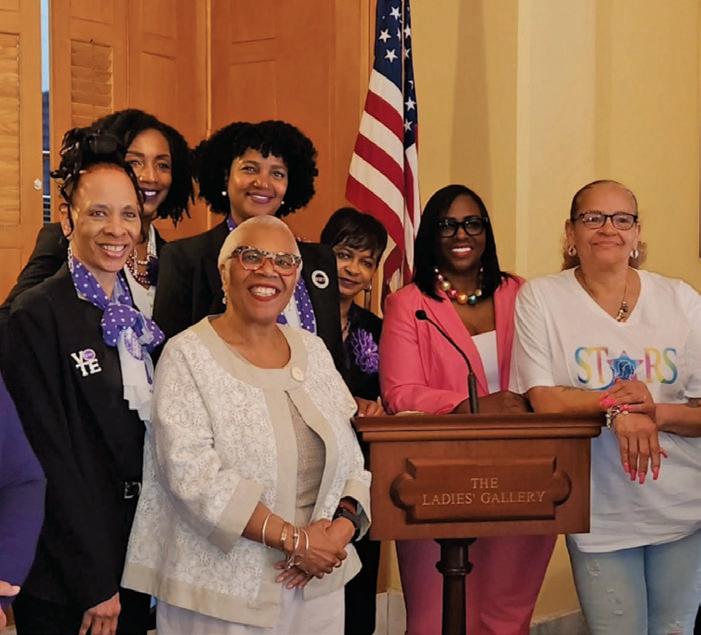
GEORGIA SOUTHERN UNIVERSITY SECTION (GA)
The Georgia Southern University Section (GA) of NCNW is kicking off the school year with a strong start, engaging students at the Student Organization Fair
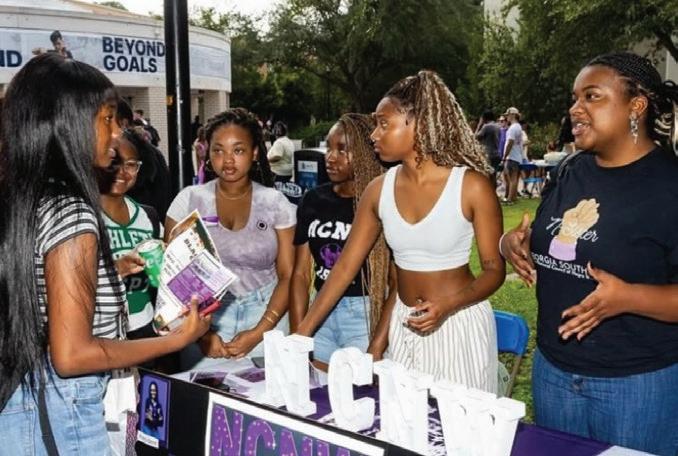
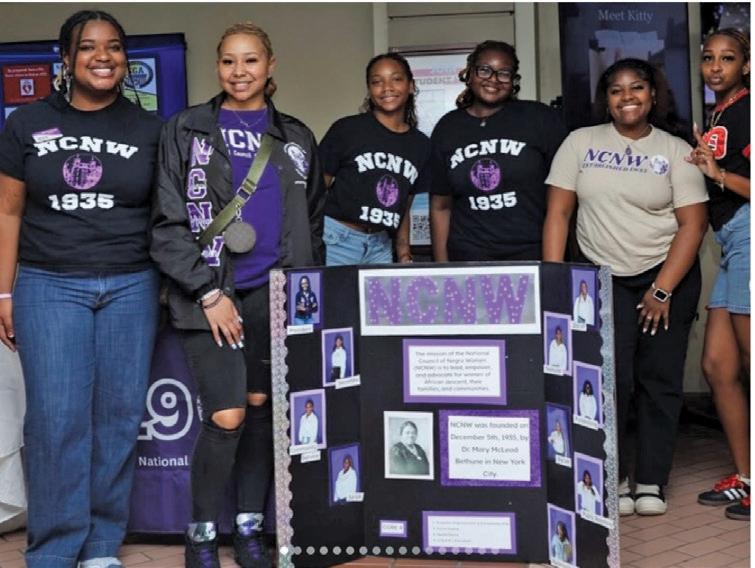
and sparking excitement for the upcoming 2025 Georgia State Conference. Members are balancing service and scholarship with their Booked & Busy study hall, creating space for academic excellence and community building.
HENRY CLAYTON SECTION (GA)
The Henry Clayton Section (GA) hosted its 4th Annual Purple Tees & Pearls Golf Classic, creating a day filled with fun, fellowship, and friendly competition. With the support of participants and sponsors, the event successfully raised vital funds to help local youth further their education.
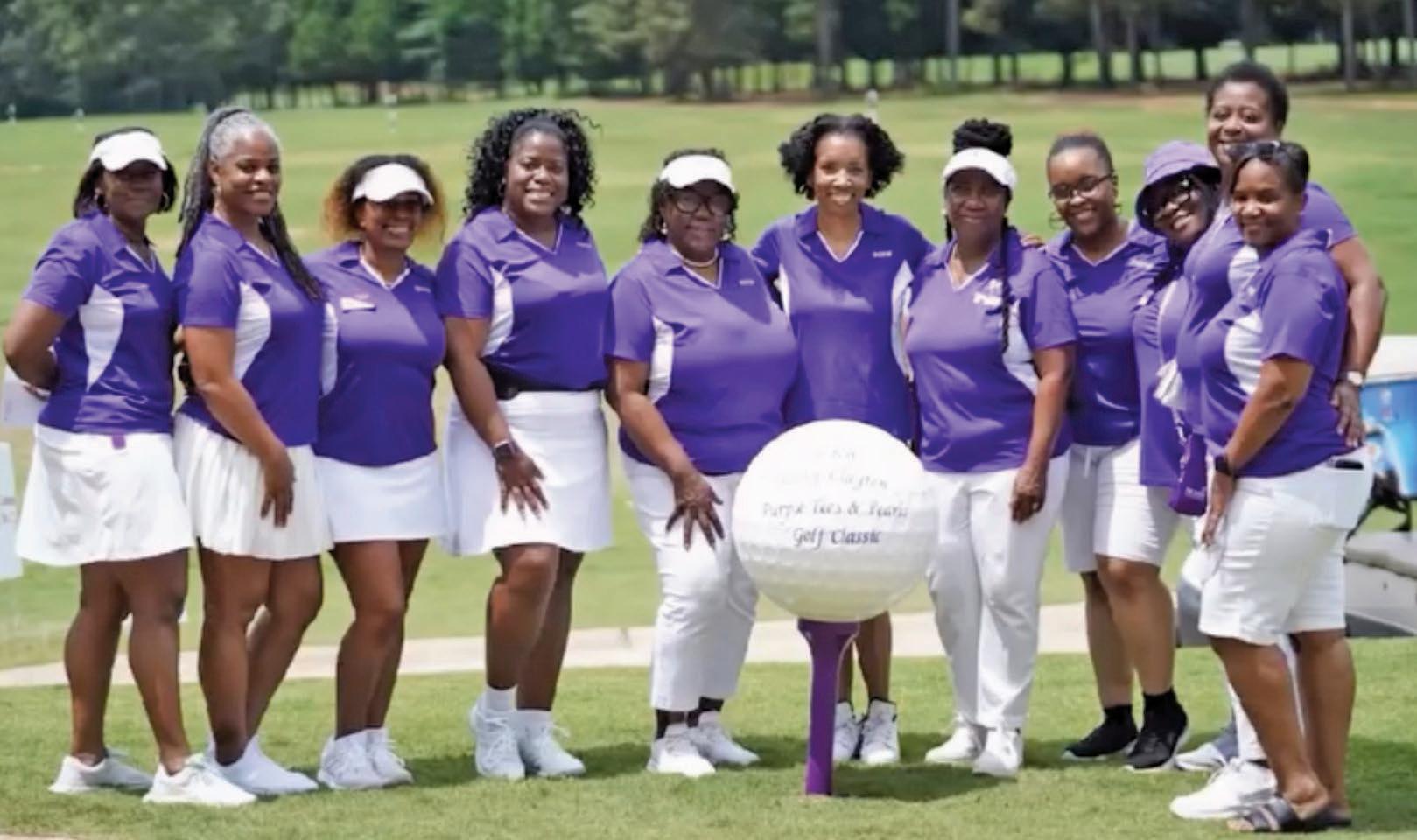
MANHATTAN SECTION (NY)
Manhattan Section (NY) members packed backpacks with school supplies in preparation for a back-to-school giveaway. From pencils and notebooks to crayons and folders, each backpack was thoughtfully packed to help students start the school year off right.
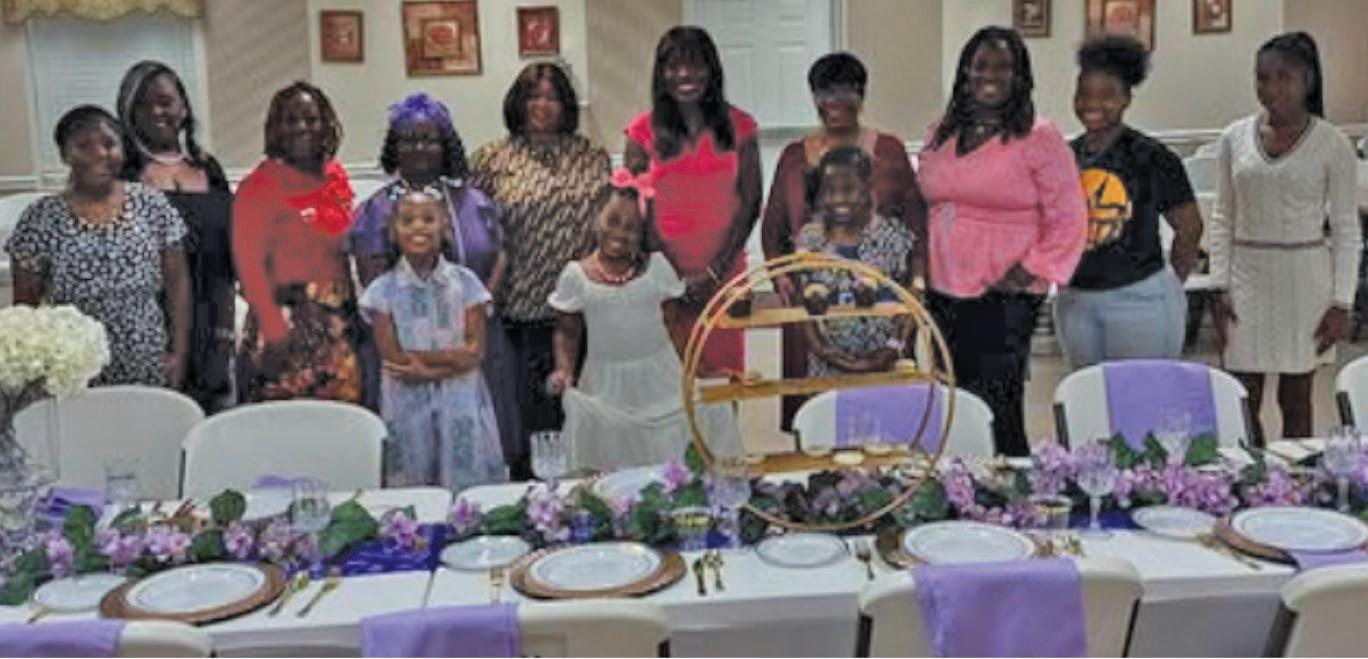
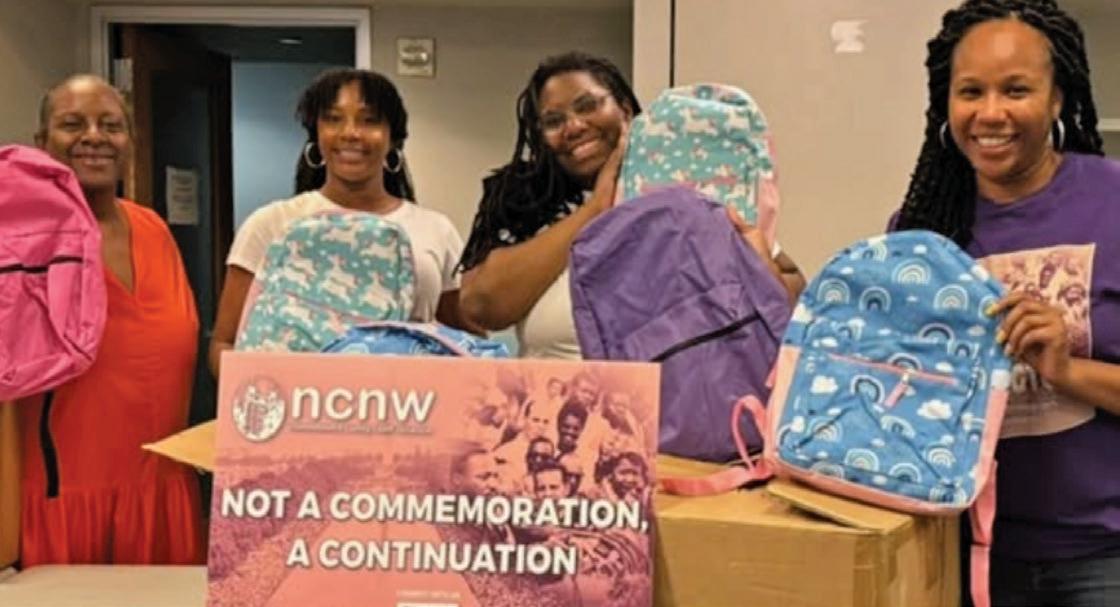
RESTON DULLES SECTION (VA)
The Reston Dulles (VA) Section volunteered with the Fueling Minds, Feeding Futures Food Drive! Members collected 4.5 carts of non-perishable items to support Helping Hungry Kids, a nonprofit providing weekend meals to children across the area.
UT SECTION (TX)
VALDOSTA-LOWNDES METRO SECTION (GA)
The NCNW Valdosta-Lowndes Metro Section (GA) hosted the Etiquette & Tea Brunch at New Hope Baptist Church. We were pleased to welcome attendees for an afternoon of learning and refinement led by a certified etiquette consultant.

UT Section committee officers and sisters joined the Greater Austin (TX) Section’s Good Health WINs committee to volunteer at Vitals & Vibes at The Chapel, hosted by the Black Leaders Collective Health Issues Group. Together, they supported community health initiatives and engaged with local residents.
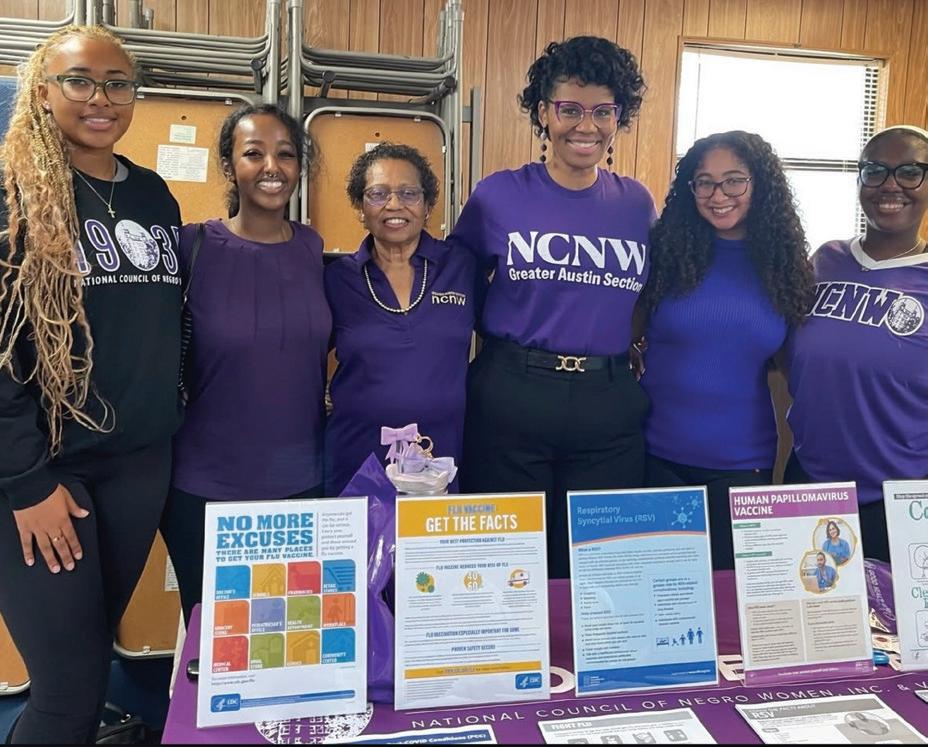
ACCESSING THE U.S. CONSTITUTION: TRUSTED RESOURCES
WHY WE ARE SHARING THIS
In recent years, sections of the U.S. Constitution have been altered or removed from certain federal websites, creating uncertainty for those who rely on .gov sites for reference. To ensure NCNW members and affiliates have uninterrupted and reliable access to the full text of the Constitution and its amendments, we are providing a list of trusted, alternative sources. These resources allow our community to continue engaging in informed advocacy, civic education, and leadership without concern that primary materials will be unavailable.

This resource is provided solely for informational purposes. NCNW does not endorse or recommend any of the organizations associated with this content. Access is provided only to ensure that members and affiliates have a trusted reference to the full text of the U.S. Constitution and related materials.
SOURCE: American Bar Association

We the People
of the United States,
in Order to form a more perfect Union, establish Justice, insure domestic Tranquility, provide for the common defence, promote the general Welfare, and secure the Blessings of Liberty to ourselves and our Posterity, do ordain and establish this Constitution for the United States of America.
Article I
Section 1.
All legislative Powers herein granted shall be vested in a Congress of the United States, which shall consist of a Senate and House of Representatives.
Section 2.
The House of Representatives shall be composed of Members chosen every second Year by the People of the several States, and the Electors in each State shall have the Qualifications requisite for Electors of the most numerous Branch of the State Legislature. No Person shall be a Representative who shall not have attained to the Age of twenty five Years, and been seven Years a Citizen of the United States, and who shall not, when elected, be an Inhabitant of that State in which he shall be chosen.
Representatives and direct Taxes shall be apportioned among the several States which may be included within this Union, according to their respective Numbers, which shall be determined by adding to the whole Number of free Persons, including those bound to Service for a Term of Years, and excluding Indians not taxed, three fifths of all other Persons. (Note:changed by section 2 of the Fourteenth Amendment.)The actual Enumeration shall be made within three Years after the first Meeting of the Congress of the United States, and within every subsequent Term of ten Years, in such Manner as they shall by Law direct. The Number of Representatives shall not exceed one for every thirty Thousand, but each State shall have at Least one Representative; and until such enumeration shall be made, the State of New Hampshire shall be entitled to chuse three, Massachusetts eight, Rhode-Island and Providence Plantations one, Connecticut five, New-York six, New Jersey four, Pennsylvania eight, Delaware one, Maryland six,Virginia ten, North Carolina five, South Carolina five, and Georgia three.
When vacancies happen in the Representation from any State, the Executive Authority thereof shall issue Writs of Election to fill such Vacancies.
The House of Representatives shall chuse their Speaker and other Officers; and shall have the sole Power of Impeachment.
Section 3.
The Senate of the United States shall be composed of two Senators from each State,chosen by the Legislature thereof, (Note: changed by the Seventeenth Amendment.) for six Years; and each Senator shall have one Vote.
Immediately after they shall be assembled in Consequence of the first Election, they shall be divided as equally as may be into three Classes. The Seats of the Senators of the first Class shall be vacated at the Expiration of the second Year, of the second Class at the Expiration of the fourth Year, and of the third Class at the Expiration of the sixth Year, so that one third may be chosen every second Year; and if Vacancies happen by Resignation, or otherwise, during the Recess of the Legislature of any State, the Executive thereof may make temporary Appointments until the next Meeting of the Legislature, which shall then fill such Vacancies. (Note:changed by the Seventeenth Amendment.)
No Person shall be a Senator who shall not have attained to the Age of thirty Years, and been nine Years a Citizen of the United States, and who shall not, when elected, be an Inhabitant of that State for which he shall be chosen.
The Vice President of the United States shall be President of the Senate, but shall have no Vote, unless they be equally divided.
The Senate shall chuse their other Officers, and also a President pro tempore, in the Absence of the Vice President, or when he shall exercise the Office of President of the United States.
The Senate shall have the sole Power to try all Impeachments. When sitting for that Purpose, they shall be on Oath or Affirmation. When the President of the United States is tried, the Chief Justice shall preside:And no Person shall be convicted without the Concurrence of two thirds of the Members present.
Judgment in Cases of Impeachment shall not extend further than to removal from Office, and disqualification to hold and enjoy any Office of honor,Trust or Profit under the United States: but the Party convicted shall nevertheless be liable and subject to Indictment,Trial, Judgment and Punishment, according to Law.
Section 4.
The Times, Places and Manner of holding Elections for Senators and Representatives, shall be prescribed in each State by the Legislature thereof; but the Congress may at any time by Law make or alter such Regulations, except as to the Places of chusing Senators.
The Congress shall assemble at least once in every Year, and such Meeting shall be on the first Monday in December, (Note: changed by section 2 of the Twentieth Amendment.) unless they shall by Law appoint a different Day.
Section 5.
Each House shall be the Judge of the Elections, Returns and Qualifications of its own Members, and a Majority of each shall constitute a Quorum to do Business; but a smaller Number may adjourn from day to day, and may be authorized to compel the Attendance of absent Members, in such Manner, and under such Penalties as each House may provide.
Each House may determine the Rules of its Proceedings, punish its Members for disorderly Behaviour, and, with the Concurrence of two thirds, expel a Member.
Each House shall keep a Journal of its Proceedings, and from time to time publish the same, excepting such Parts as may in their Judgment require Secrecy; and the Yeas and Nays of the Members of either House on any question shall, at the Desire of one fifth of those Present, be entered on the Journal.

Neither House, during the Session of Congress, shall, without the Consent of the other, adjourn for more than three days, nor to any other Place than that in which the two Houses shall be sitting.
Section 6.
The Senators and Representatives shall receive a Compensation for their Services, to be ascertained by Law, and paid out of the Treasury of the United States. They shall in all Cases, except Treason, Felony and Breach of the Peace, be privileged from Arrest during their Attendance at the Session of their respective Houses, and in going to and returning from the same; and for any Speech or Debate in either House, they shall not be questioned in any other Place.
No Senator or Representative shall, during the Time for which he was elected, be appointed to any civil Office under the Authority of the United States, which shall have been created, or the Emoluments whereof shall have been encreased during such time; and no Person holding any Office under the United States, shall be a Member of either House during his Continuance in Office.
Section 7.
All Bills for raising Revenue shall originate in the House of Representatives; but the Senate may propose or concur with Amendments as on other Bills.
Every Bill which shall have passed the House of Representatives and the Senate, shall, before it become a Law, be presented to the President of the United States; If he approve he shall sign it, but if not he shall return it, with his Objections to that House in which it shall have originated, who shall enter the Objections at large on their Journal, and proceed to reconsider it. If after such Reconsideration two thirds of that House shall agree to pass the Bill, it shall be sent, together with the Objections, to the other House, by which it shall likewise be reconsidered, and if approved by two thirds of that House, it shall become a Law. But in all such Cases the Votes of both Houses shall be determined by yeas and Nays, and the Names of the Persons voting for and against the Bill shall be entered on the Journal of each House respectively. If any Bill shall not be returned by the President within ten Days (Sundays excepted) after it shall have been presented to him, the Same shall be a Law, in like Manner as if he had signed it, unless the Congress by their Adjournment prevent its Return, in which Case it shall not be a Law.
Every Order, Resolution, or Vote to which the Concurrence of the Senate and House of Representatives may be necessary (except on a question of Adjournment) shall be presented to the President of the United States; and before the Same shall take Effect, shall be approved by him, or being disapproved by him, shall be repassed by two thirds of the Senate and House of Representatives, according to the Rules and Limitations prescribed in the Case of a Bill.
Section 8.
The Congress shall have Power To lay and collect Taxes, Duties, Imposts and Excises, to pay the Debts and provide for the common Defence and general Welfare of the United States; but all Duties, Imposts and Excises shall be uniform throughout the United States;
To borrow Money on the credit of the United States;
To regulate Commerce with foreign Nations, and among the several States, and with the Indian Tribes;
To establish an uniform Rule of Naturalization, and uniform Laws on the subject of Bankruptcies throughout the United States;
To coin Money, regulate the Value thereof, and of foreign Coin, and fix the Standard of Weights and Measures;
To provide for the Punishment of counterfeiting the Securities and current Coin of the United States;
To establish Post Offices and post Roads;
To promote the Progress of Science and useful Arts, by securing for limited Times to Authors and Inventors the exclusive Right to their respective Writings and Discoveries;
To constitute Tribunals inferior to the supreme Court;
To define and punish Piracies and Felonies committed on the high Seas, and Offences against the Law of Nations;
To declare War, grant Letters of Marque and Reprisal, and make Rules concerning Captures on Land and Water;
To raise and support Armies, but no Appropriation of Money to that Use shall be for a longer Term than two Years;
To provide and maintain a Navy;
To make Rules for the Government and Regulation of the land and naval Forces;
To provide for calling forth the Militia to execute the Laws of the Union, suppress Insurrections and repel Invasions;
To provide for organizing, arming, and disciplining, the Militia, and for governing such Part of them as may be employed in the Service of the United States, reserving to the States respectively, the Appointment of the Officers, and the Authority of training the Militia according to the discipline prescribed by Congress;
To exercise exclusive Legislation in all Cases whatsoever, over such District (not exceeding ten Miles square) as may, by Cession of particular States, and the Acceptance of Congress, become the Seat of the Government of the United States, and to exercise like Authority over all Places purchased by the Consent of the Legislature of the State in which the Same shall be, for the Erection of Forts, Magazines,Arsenals, dock-Yards, and other needful Buildings;--And
To make all Laws which shall be necessary and proper for carrying into Execution the foregoing Powers, and all other Powers vested by this Constitution in the Government of the United States, or in any Department or Officer thereof.
Section 9.
The Migration or Importation of such Persons as any of the States now existing shall think proper to admit, shall not be prohibited by the Congress prior to the Year one thousand eight hundred and eight, but a Tax or duty may be imposed on such Importation, not exceeding ten dollars for each Person.
The Privilege of the Writ of Habeas Corpus shall not be suspended, unless when in Cases of Rebellion or Invasion the public Safety may require it.

No Bill of Attainder or ex post facto Law shall be passed.
No Capitation, or other direct,Tax shall be laid, unless in Proportion to the Census or Enumeration herein before directed to be taken. (Note: see the Sixteenth Amendment.)
No Tax or Duty shall be laid on Articles exported from any State.
No Preference shall be given by any Regulation of Commerce or Revenue to the Ports of one State over those of another: nor shall Vessels bound to, or from, one State, be obliged to enter,clear, or pay Duties in another.
No Money shall be drawn from the Treasury, but in Consequence of Appropriations made by Law; and a regular Statement and Account of the Receipts and Expenditures of all public Money shall be published from time to time.
No Title of Nobility shall be granted by the United States:And no Person holding any Office of Profit or Trust under them, shall, without the Consent of the Congress, accept of any present, Emolument, Office, or Title, of any kind whatever, from any King, Prince, or foreign State.
Section 10.
No State shall enter into any Treaty,Alliance, or Confederation; grant Letters of Marque and Reprisal;coin Money; emit Bills of Credit; make any Thing but gold and silver Coin a Tender in Payment of Debts; pass any Bill of Attainder, ex post facto Law, or Law impairing the Obligation of Contracts, or grant any Title of Nobility.
No State shall, without the Consent of the Congress, lay any Imposts or Duties on Imports or Exports, except what may be absolutely necessary for executing it’s inspection Laws: and the net Produce of all Duties and Imposts, laid by any State on Imports or Exports, shall be for the Use of the Treasury of the United States; and all such Laws shall be subject to the Revision and Controul of the Congress.
No State shall, without the Consent of Congress, lay any Duty of Tonnage, keep Troops, or Ships of War in time of Peace, enter into any Agreement or Compact with another State, or with a foreign Power, or engage in War, unless actually invaded, or in such imminent Danger as will not admit of delay.
Article II
Section 1.
The executive Power shall be vested in a President of the United States of America. He shall hold his Office during the Term of four Years, and, together with the Vice President,chosen for the same Term, be elected, as follows
Each State shall appoint, in such Manner as the Legislature thereof may direct, a Number of Electors, equal to the whole Number of Senators and Representatives to which the State may be entitled in the Congress: but no Senator or Representative, or Person holding an Office of Trust or Profit under the United States, shall be appointed an Elector.
The Electors shall meet in their respective States, and vote by Ballot for two Persons, of whom one at least shall not be an
Inhabitant of the same State with themselves. And they shall make a List of all the Persons voted for, and of the Number of Votes for each; which List they shall sign and certify, and transmit sealed to the Seat of the Government of the United States, directed to the President of the Senate. The President of the Senate shall, in the Presence of the Senate and House of Representatives, open all the Certificates, and the Votes shall then be counted. The Person having the greatest Number of Votes shall be the President, if such Number be a Majority of the whole Number of Electors appointed; and if there be more than one who have such Majority, and have an equal Number of Votes, then the House of Representatives shall immediately chuse by Ballot one of them for President; and if no Person have a Majority, then from the five highest on the List the said House shall in like Manner chuse the President. But in chusing the President, the Votes shall be taken by States, the Representation from each State having one Vote;A quorum for this Purpose shall consist of a Member or Members from two thirds of the States, and a Majority of all the States shall be necessary to a Choice. In every Case, after the Choice of the President, the Person having the greatest Number of Votes of the Electors shall be the Vice President. But if there should remain two or more who have equal Votes, the Senate shall chuse from them by Ballot the Vice President. (Note:changed by the Twelfth Amendment.)
The Congress may determine the Time of chusing the Electors, and the Day on which they shall give their Votes; which Day shall be the same throughout the United States.
No Person except a natural born Citizen, or a Citizen of the United States, at the time of the Adoption of this Constitution, shall be eligible to the Office of President; neither shall any Person be eligible to that Office who shall not have attained to the Age of thirty five Years, and been fourteen Years a Resident within the United States.
In Case of the Removal of the President from Office, or of his Death, Resignation, or Inability to discharge the Powers and Duties of the said Office, the Same shall devolve on the Vice President, and the Congress may by Law provide for the Case of Removal, Death, Resignation or Inability, both of the President and Vice President, declaring what Officer shall then act as President, and such Officer shall act accordingly, until the Disability be removed, or a President shall be elected. (Note: changed by the TwentyFifth Amendment.)
The President shall, at stated Times, receive for his Services, a Compensation, which shall neither be encreased nor diminished during the Period for which he shall have been elected, and he shall not receive within that Period any other Emolument from the United States, or any of them.
Before he enter on the Execution of his Office, he shall take the following Oath or Affirmation:--”I do solemnly swear (or affirm) that I will faithfully execute the Office of President of the United States, and will to the best of my Ability, preserve, protect and defend the Constitution of the United States.”
Section 2.
The President shall be Commander in Chief of the Army and Navy of the United States, and of the Militia of the several States, when called into the actual Service of the United States; he may require the Opinion, in writing, of the principal Officer in each of the executive Departments, upon any Subject relating to the

Duties of their respective Offices, and he shall have Power to grant Reprieves and Pardons for Offences against the United States, except in Cases of Impeachment.
He shall have Power, by and with the Advice and Consent of the Senate, to make Treaties, provided two thirds of the Senators present concur; and he shall nominate, and by and with the Advice and Consent of the Senate, shall appoint Ambassadors, other public Ministers and Consuls, Judges of the supreme Court, and all other Officers of the United States, whose Appointments are not herein otherwise provided for, and which shall be established by Law: but the Congress may by Law vest the Appointment of such inferior Officers, as they think proper, in the President alone, in the Courts of Law, or in the Heads of Departments.
The President shall have Power to fill up all Vacancies that may happen during the Recess of the Senate, by granting Commissions which shall expire at the End of their next Session.
Section 3.
He shall from time to time give to the Congress Information of the State of the Union, and recommend to their Consideration such Measures as he shall judge necessary and expedient; he may, on extraordinary Occasions,convene both Houses, or either of them, and in Case of Disagreement between them, with Respect to the Time of Adjournment, he may adjourn them to such Time as he shall think proper; he shall receive Ambassadors and other public Ministers; he shall take Care that the Laws be faithfully executed, and shall Commission all the Officers of the United States.
Section 4.
The President,Vice President and all civil Officers of the United States, shall be removed from Office on Impeachment for, and Conviction of,Treason, Bribery, or other high Crimes and Misdemeanors.
Article III
Section 1.
The judicial Power of the United States, shall be vested in one supreme Court, and in such inferior Courts as the Congress may from time to time ordain and establish. The Judges, both of the supreme and inferior Courts, shall hold their Offices during good Behaviour, and shall, at stated Times, receive for their Services, a Compensation, which shall not be diminished during their Continuance in Office.
Section 2.
The judicial Power shall extend to all Cases, in Law and Equity, arising under this Constitution, the Laws of the United States, and Treaties made, or which shall be made, under their Authority;-to all Cases affecting Ambassadors, other public Ministers and Consuls;--to all Cases of admiralty and maritime Jurisdiction;-to Controversies to which the United States shall be a Party;-to Controversies between two or more States;--between a State and Citizens of another State; (Note:changed by the Eleventh Amendment.)--between Citizens of different States, --between Citizens of the same State claiming Lands under Grants of different
States, and between a State, or the Citizens thereof, and foreign States, Citizens or Subjects. (Note:changed by the Eleventh Amendment.) In all Cases affecting Ambassadors, other public Ministers and Consuls, and those in which a State shall be Party, the supreme Court shall have original Jurisdiction.
In all the other Cases before mentioned, the supreme Court shall have appellate Jurisdiction, both as to Law and Fact, with such Exceptions, and under such Regulations as the Congress shall make. The Trial of all Crimes, except in Cases of Impeachment, shall be by Jury; and such Trial shall be held in the State where the said Crimes shall have been committed; but when not committed within any State, the Trial shall be at such Place or Places as the Congress may by Law have directed.
Section 3.
Treason against the United States, shall consist only in levying War against them, or in adhering to their Enemies, giving them Aid and Comfort. No Person shall be convicted of Treason unless on the Testimony of two Witnesses to the same overt Act, or on Confession in open Court.
The Congress shall have Power to declare the Punishment of Treason, but no Attainder of Treason shall work Corruption of Blood, or Forfeiture except during the Life of the Person attainted.
Article IV
Section 1.
Full Faith and Credit shall be given in each State to the public Acts, Records, and judicial Proceedings of every other State. And the Congress may by general Laws prescribe the Manner in which such Acts, Records and Proceedings shall be proved, and the Effect thereof.
Section 2.
The Citizens of each State shall be entitled to all Privileges and Immunities of Citizens in the several States.
A Person charged in any State with Treason, Felony, or other Crime, who shall flee from Justice, and be found in another State, shall on Demand of the executive Authority of the State from which he fled, be delivered up, to be removed to the State having Jurisdiction of the Crime.
No Person held to Service or Labour in one State, under the Laws thereof, escaping into another, shall, in Consequence of any Law or Regulation therein, be discharged from such Service or Labour, but shall be delivered up on Claim of the Party to whom such Service or Labour may be due. (Note:changed by the Thirteenth Amendment.)
Section 3.
New States may be admitted by the Congress into this Union; but no new State shall be formed or erected within the Jurisdiction of any other State; nor any State be formed by the Junction of two or more States, or Parts of States, without the Consent of the Legislatures of the States concerned as well as of the Congress.
The Congress shall have Power to dispose of and make all needful Rules and Regulations respecting the Territory or other Property
belonging to the United States; and nothing in this Constitution shall be so construed as to Prejudice any Claims of the United States, or of any particular State.
Section 4.
The United States shall guarantee to every State in this Union a Republican Form of Government, and shall protect each of them against Invasion; and on Application of the Legislature, or of the Executive (when the Legislature cannot be convened) against domestic Violence.
Article V
The Congress, whenever two thirds of both Houses shall deem it necessary, shall propose Amendments to this Constitution, or, on the Application of the Legislatures of two thirds of the several States, shall call a Convention for proposing Amendments, which, in either Case, shall be valid to all Intents and Purposes, as Part of this Constitution, when ratified by the Legislatures of three fourths of the several States, or by Conventions in three fourths thereof, as the one or the other Mode of Ratification may be proposed by the Congress; Provided that no Amendment which may be made prior to the Year One thousand eight hundred and eight shall in any Manner affect the first and fourth Clauses in the Ninth Section of the first Article; and that no State, without its Consent, shall be deprived of its equal Suffrage in the Senate.
Bill of Rights: Amendments I - X
(Ratified December 15, 1791)
Amendment I
Congress shall make no law respecting an establishment of religion, or prohibiting the free exercise thereof; or abridging the freedom of speech, or of the press; or the right of the people peaceably to assemble, and to petition the Government for a redress of grievances.
Amendment II
A well regulated Militia, being necessary to the security of a free State, the right of the people to keep and bear Arms, shall not be infringed.
Amendment III
No Soldier shall, in time of peace be quartered in any house, without the consent of the Owner, nor in time of war, but in a manner to be prescribed by law.
Amendment IV
The right of the people to be secure in their persons, houses, papers, and effects, against unreasonable searches and seizures, shall not be violated, and no Warrants shall issue, but upon probable cause, supported by Oath or affirmation, and particularly describing the place to be searched, and the persons or things to be seized.
Amendment V
No person shall be held to answer for a capital, or otherwise infamous crime, unless on a presentment or indictment of a Grand
Article VI
All Debts contracted and Engagements entered into, before the Adoption of this Constitution, shall be as valid against the United States under this Constitution, as under the Confederation.
This Constitution, and the Laws of the United States which shall be made in Pursuance thereof; and all Treaties made, or which shall be made, under the Authority of the United States, shall be the supreme Law of the Land; and the Judges in every State shall be bound thereby, any Thing in the Constitution or Laws of any State to the Contrary notwithstanding.
The Senators and Representatives before mentioned,and the Members of the several State Legislatures,and all executive and judicial Officers, both of the United States and of the several States, shall be bound by Oath or Affirmation, to support this Constitution; but no religious Test shall ever be required as a Qualification to any Office or public Trust under the United States.
Article VII
The ratification of the conventions of nine states, shall be sufficient for the establishment of this Constitution between the states so ratifying the same.

Jury, except in cases arising in the land or naval forces, or in the Militia, when in actual service in time of War or public danger; nor shall any person be subject for the same offense to be twice put in jeopardy of life or limb; nor shall be compelled in any criminal case to be a witness against himself, nor be deprived of life, liberty, or property, without due process of law; nor shall private property be taken for public use, without just compensation.
Amendment Vi
In all criminal prosecutions, the accused shall enjoy the right to a speedy and public trial, by an impartial jury of the State and district wherein the crime shall have been committed, which district shall have been previously ascertained by law, and to be informed of the nature and cause of the accusation; to be confronted with the witnesses against him; to have compulsory process for obtaining witnesses in his favor, and to have the Assistance of Counsel for his defence.
Amendment Vii
In Suits at common law,where the value in controversy shall exceed twenty dollars, the right of trial by jury shall be preserved,and no fact tried by a jury,shall be otherwise re-examined in any Court of the United States, than according to the rules of the common law.
Amendment Viii
Excessive bail shall not be required, nor excessive fines imposed, nor cruel and unusual punishments inflicted.
Amendment IX
The enumeration in the Constitution, of certain rights, shall not be construed to deny or disparage others retained by the people.

Amendment X
The powers not delegated to the United States by the Constitution, nor prohibited by it to the States, are reserved to the States respectively, or to the people.
Amendment XI (Ratified February 7, 1795)
The Judicial power of the United States shall not be construed to extend to any suit in law or equity,commenced or prosecuted against one of the United States by Citizens of another State, or by Citizens or Subjects of any Foreign State.
Amendment XII (Ratified June 15, 1804)
The Electors shall meet in their respective states, and vote by ballot for President and Vice-President, one of whom, at least, shall not be an inhabitant of the same state with themselves; they shall name in their ballots the person voted for as President, and in distinct ballots the person voted for as Vice-President, and they shall make distinct lists of all persons voted for as President, and of all persons voted for as Vice-President and of the number of votes for each, which lists they shall sign and certify, and transmit sealed to the seat of the government of the United States, directed to the President of the Senate;--The President of the Senate shall, in the presence of the Senate and House of Representatives, open all the certificates and the votes shall then be counted;--The person having the greatest number of votes for President, shall be the President, if such number be a majority of the whole number of Electors appointed; and if no person have such majority, then from the persons having the highest numbers not exceeding three on the list of those voted for as President, the House of Representatives shall choose immediately, by ballot, the President. But in choosing the President, the votes shall be taken by states, the representation from each state having one vote; a quorum for this purpose shall consist of a member or members from two-thirds of the states, and a majority of all the states shall be necessary to a choice. And if the House of Representatives shall not choose a President whenever the right of choice shall devolve upon them, before the fourth day of March next following, then the Vice-President shall act as President, as in the case of the death or other constitutional disability of the President. (Note: superseded by section 3 of the Twentieth Amendment.)--The person having the greatest number of votes as Vice-President, shall be the Vice President, if such number be a majority of the whole number of Electors appointed, and if no person have a majority, then from the two highest numbers on the list, the Senate shall choose the Vice-President; a quorum for the purpose shall consist of two-thirds of the whole number of Senators, and a majority of the whole number shall be necessary to a choice. But no person constitutionally ineligible to the office of President shall be eligible to that of Vice-President of the United States.
Amendment XIII (Ratified December 6, 1865)
Section 1.
Neither slavery nor involuntary servitude, except as a punishment for crime whereof the party shall have been duly convicted, shall exist within the United States, or any place subject to their jurisdiction.
Section 2.
Congress shall have power to enforce this article by appropriate legislation.
Amendment XIV (Ratified July 9, 1868)
Section 1.
All persons born or naturalized in the United States, and subject to the jurisdiction thereof, are citizens of the United States and of the State wherein they reside. No State shall make or enforce any law which shall abridge the privileges or immunities of citizens of the United States; nor shall any State deprive any person of life, liberty, or property, without due process of law; nor deny to any person within its jurisdiction the equal protection of the laws.
Section 2.
Representatives shall be apportioned among the several States according to their respective numbers,counting the whole number of persons in each State, excluding Indians not taxed. But when the right to vote at any election for the choice of electors for President and Vice-President of the United States, Representatives in Congress, the Executive and Judicial officers of a State, or the members of the Legislature thereof, is denied to any of the male inhabitants of such State, being twenty-one years of age, and citizens of the United States, or in any way abridged, except for participation in rebellion, or other crime, the basis of representation therein shall be reduced in the proportion which the number of such male citizens shall bear to the whole number of male citizens twenty-one years of age in such State.
Section 3.
No person shall be a Senator or Representative in Congress, or elector of President and Vice-President, or hold any office,civil or military, under the United States, or under any State, who, having previously taken an oath, as a member of Congress, or as an officer of the United States, or as a member of any State legislature, or as an executive or judicial officer of any State, to support the Constitution of the United States, shall have engaged in insurrection or rebellion against the same, or given aid or comfort to the enemies thereof. But Congress may by a vote of two-thirds of each House, remove such disability.
Section 4.
The validity of the public debt of the United States, authorized by law, including debts incurred for payment of pensions and bounties for services in suppressing insurrection or rebellion, shall not be questioned. But neither the United States nor any State shall assume or pay any debt or obligation incurred in aid of insurrection or rebellion against the United States, or any claim for the loss or emancipation of any slave; but all such debts, obligations and claims shall be held illegal and void.
Section 5.
The Congress shall have power to enforce, by appropriate legislation, the provisions of this article.
Amendment XV (Ratified February 3, 1870)
Section 1.
The right of citizens of the United States to vote shall not be denied or abridged by the United States or by any State on account of race,color, or previous condition of servitude.

Section 2.
The Congress shall have power to enforce this article by appropriate legislation.
Amendment XVI (Ratified February 3, 1913)
The Congress shall have power to lay and collect taxes on incomes, from whatever source derived, without apportionment among the several States, and without regard to any census or enumeration.
Amendment XVII (Ratified April 8, 1913)
The Senate of the United States shall be composed of two Senators from each State, elected by the people thereof, for six years; and each Senator shall have one vote. The electors in each State shall have the qualifications requisite for electors of the most numerous branch of the State legislatures.
When vacancies happen in the representation of any State in the Senate, the executive authority of such State shall issue writs of election to fill such vacancies: Provided,That the legislature of any State may empower the executive thereof to make temporary appointments until the people fill the vacancies by election as the legislature may direct.
This amendment shall not be so construed as to affect the election or term of any Senator chosen before it becomes valid as part of the Constitution.
Amendment XVIII (Ratified January 16, 1919)
Section 1.
After one year from the ratification of this article the manufacture, sale, or transportation of intoxicating liquors within, the importation thereof into, or the exportation thereof from the United States and all territory subject to the jurisdiction thereof for beverage purposes is hereby prohibited.
Section 2.
The Congress and the several States shall have concurrent power to enforce this article by appropriate legislation.
Section 3.
This article shall be inoperative unless it shall have been ratified as an amendment to the Constitution by the legislatures of the several States, as provided in the Constitution, within seven years from the date of the submission hereof to the States by the Congress. (Note:This amendment was repealed by the TwentyFirst Amendment.)
Amendment XIX (Ratified August 18, 1920)
The right of citizens of the United States to vote shall not be denied or abridged by the United States or by any State on account of sex. Congress shall have power to enforce this article by appropriate legislation. Amendment XX (Ratified January 23, 1933)
Section 1.
The terms of the President and Vice President shall end at noon on the 20th day of January, and the terms of Senators and Representatives at noon on the 3d day of January, of the years in
which such terms would have ended if this article had not been ratified; and the terms of their successors shall then begin.
Section 2.
The Congress shall assemble at least once in every year, and such meeting shall begin at noon on the 3d day of January, unless they shall by law appoint a different day.
Section 3.
If, at the time fixed for the beginning of the term of the President, the President elect shall have died, the Vice President elect shall become President. If a President shall not have been chosen before the time fixed for the beginning of his term, or if the President elect shall have failed to qualify, then the Vice President elect shall act as President until a President shall have qualified; and the Congress may by law provide for the case wherein neither a President elect nor a Vice President elect shall have qualified, declaring who shall then act as President, or the manner in which one who is to act shall be selected, and such person shall act accordingly until a President or Vice President shall have qualified.
Section 4.
The Congress may by law provide for the case of the death of any of the persons from whom the House of Representatives may choose a President whenever the right of choice shall have devolved upon them, and for the case of the death of any of the persons from whom the Senate may choose a Vice President whenever the right of choice shall have devolved upon them.
Section 5.
Sections 1 and 2 shall take effect on the 15th day of October following the ratification of this article.
Section 6.
This article shall be inoperative unless it shall have been ratified as an amendment to the Constitution by the legislatures of threefourths of the several States within seven years from the date of its submission.
Amendment XXI (Ratified December 5, 1933)
Section 1.
The eighteenth article of amendment to the Constitution of the United States is hereby repealed.
Section 2.
The transportation or importation into any State,Territory, or possession of the United States for delivery or use therein of intoxicating liquors, in violation of the laws thereof, is hereby prohibited.
Section 3.
This article shall be inoperative unless it shall have been ratified as an amendment to the Constitution by conventions in the several States,as provided in the Constitution,within seven years from the date of the submission hereof to the States by the Congress.

Amendment XXII (Ratified February 27, 1951)
Section 1.
No person shall be elected to the office of the President more than twice, and no person who has held the office of President, or acted as President, for more than two years of a term to which some other person was elected President shall be elected to the office of the President more than once. But this Article shall not apply to any person holding the office of President, when this Article was proposed by the Congress, and shall not prevent any person who may be holding the office of President, or acting as President, during the term within which this Article becomes operative from holding the office of President or acting as President during the remainder of such term.
Section 2.
This article shall be inoperative unless it shall have been ratified as an amendment to the Constitution by the legislatures of threefourths of the several States within seven years from the date of its submission to the States by the Congress.
Amendment XXIII (Ratified March 29, 1961)
Section 1.
The District constituting the seat of Government of the United States shall appoint in such manner as the Congress may direct: A number of electors of President and Vice President equal to the whole number of Senators and Representatives in Congress to which the District would be entitled if it were a State, but in no event more than the least populous State; they shall be in addition to those appointed by the States, but they shall be considered, for the purposes of the election of President and Vice President, to be electors appointed by a State; and they shall meet in the District and perform such duties as provided by the twelfth article of amendment.
Section 2.
The Congress shall have power to enforce this article by appropriate legislation.
Amendment XXIV (Ratified January 23, 1964)
Section 1.
The right of citizens of the United States to vote in any primary or other election for President or Vice President, for electors for President or Vice President, or for Senator or Representative in Congress, shall not be denied or abridged by the United States or any state by reason of failure to pay any poll tax or other tax.
Section 2.
The Congress shall have power to enforce this article by appropriate legislation.
Amendment XXV (Ratified February 10, 1967)
Section 1.
In case of the removal of the President from office or of his death or resignation, the Vice President shall become President.
Section 2.
Whenever there is a vacancy in the office of the Vice President, the President shall nominate a Vice President who shall take office upon confirmation by a majority vote of both Houses of Congress.
Section 3.
Whenever the President transmits to the President pro tempore of the Senate and the Speaker of the House of Representatives his written declaration that he is unable to discharge the powers and duties of his office, and until he transmits to them a written declaration to the contrary, such powers and duties shall be discharged by the Vice President as Acting President.
Section 4.
Whenever the Vice President and a majority of either the principal officers of the executive departments or of such other body as Congress may by law provide, transmit to the President pro tempore of the Senate and the Speaker of the House of Representatives their written declaration that the President is unable to discharge the powers and duties of his office, the Vice President shall immediately assume the powers and duties of the office as Acting President.
Thereafter,when the President transmits to the President pro tempore of the Senate and the Speaker of the House of Representatives his written declaration that no inability exists, he shall resume the powers and duties of his office unless the Vice President and a majority of either the principal officers of the executive department or of such other body as Congress may by law provide, transmit within four days to the President pro tempore of the Senate and the Speaker of the House of Representatives their written declaration that the President is unable to discharge the powers and duties of his office. Thereupon Congress shall decide the issue, assembling within forty-eight hours for that purpose if not in session. If the Congress,within twenty-one days after receipt of the latter written declaration, or, if Congress is not in session,within twenty-one days after Congress is required to assemble, determines by two-thirds vote of both Houses that the President is unable to discharge the powers and duties of his office, the Vice President shall continue to discharge the same as Acting President; otherwise, the President shall resume the powers and duties of his office.
Amendment XXVI (Ratified July 1, 1971)
Section 1.
The right of citizens of the United States, who are 18 years of age or older, to vote, shall not be denied or abridged by the United States or any state on account of age.
Section 2.
The Congress shall have the power to enforce this article by appropriate legislation.
Amendment XXVII (Ratified May 7, 1992)
No Law, varying the compensation for the services of the Senators and Representatives shall take effect, until an election of Representatives shall have intervened.
Upcoming EVENTS
NCNW CALENDAR & AFFILIATE EVENTS
AFFILIATE EVENTS
Chums, Incorporated 64th National Conclave October 2025 Richmond, VA
Eta Phi Beta Sorority, Incorporated Grand Boule Summer of 2026 Nashville, Tennessee
Iota Phi Lambda, Incorporated
National Coalition of 100 Black Women, Incorporated Biennial National Conference October 2026
Women’s Home & Overseas Missionary Society, AME Zion Church Leadership Training Institute April 9-12, 2026 Ridgecrest, NC
Women’s Missionary Society, AME Church Executive Board January 2026
Baltimore, MD


To learn more about Bright Smiles, Bright Futures and how to brush twice a day scan the QR code.
For 25 years, Colgate Bright Smiles, Bright Futures has partnered with the National Council of Negro Women, Incorporated to bring oral health education to millions of children and their families in the United States. We look forward to continuing our valued partnership to “Make More Smiles”.
SISTERS New Legacy Life, Life, and Associate Life Supporters
AS OF MAY 30, 2025 – AUGUST 28, 2025
LEGACY LIFE MEMBERS
Ms. Jeanne A. Aikens
Mrs. Frankie Albert
Ms. Sharise Beatong-Wilson
Ms. Metrica Brown
Ms. Junita Carn
Ms. Rosalyn Carpenter
Dr. Tasha Dean
Ms. Deborah Deborah Payne
Ms. Gwendolyn Dennis-Mack
Mrs. Iris Gaddis-Hazel
Ms. Monica Garnes
Ms. Sharon Goodine
Ms. Angela Graham
Ms. Patricia Greenidge
Ms. Brenda Greenway
Dr. Jennifer Griffin
Ms. Linda Hardy
Ms. Patricia Harrison
Ms. Kimberly Havens McVea
Ms. Wallicia Hayes
Ms. Jennifer Henry
Ms. E. Florence Hervery
Miss Regina Johnson
Dr. Thermajean Jones
Rev. Dr. Deborah Keaton
Ms. Candace Martin
Ms. Elizabeth McFarland Garrett
Dr. Fonda Mosal
Ms. Nicole Reid-Christopher
Ms. Leah Richberg
Dr. Sabrina Robins
Ms. Lashun Rogers
Mrs. Gayle Spencer-Ridley
Dr. Tracy Thomas
Mrs. Alicia Tutt
Mrs. Naimah Wimberly
Mrs. Gladys Woods
Ms. Chante Woods
LIFE MEMBERS
Ms. Jeannette Abrahamson
Ms. Toyin Ajasin
Rev. Felecia Alexander
Ms. Petrina Alexander-Perteet
Dr. Karen Anderson
Dr. Sharria Anderson
Ms. Wanda Arthur
Ms. Shanella Ashley-Lewis
Ms. Beverly Austin
Ms. Tomika Bacon
Ms. Kellee Bacote
Ms. Khaya Baker
Ms. Angel Baldwin
Dr. Brenda Barbour
Ms. Felecia Barnes
Ms. London Baskin
Ms. Betty A. Bennafield
Ms. Sabrina Billups
Ms. Sarah Bingham
Ms. Shantae Boyd
Ms. Nina Boylen
Mrs. LaToria Brent
Ms. Malene’ S.N. Brissett
Ms. Keisha Brown
Ms. Tajuana Brown
Ms. Angelia Brown
Ms. Veronica Browne Barnes
Ms. Sherri Brown-Webster
Dr. Mynora Bryant
Ms. Anne Marie Bryant
Ms. Germaine Buchanan
Ms. Pamela Campbell
Ms. Allison Campbell
Ms. Maxine Campbell
Ms. Omari Cannon
Ms. Shanae Carrington
Ms. Yannique Carter
Ms. Rosalind Clarke
Ms. Yvette D. Clarke
Ms. Alberta Coker
Ms. Alicia Coleman
Ms. Beth Coleman-Oliver
Mrs. Deborah Coleman-Void
Ms. Monica R. Collins
Dr. Quinetta Connally
Ms. Sharon Coombs-Rose
Ms. Joyce Corley
Ms. Tanisha Corporal
Ms. Linda Coverdale
Ms. Celestine Cox
Ms. Tanya Crawford
Ms. DeKeena Cray
Ms. Aida Crowley
Ms. Yvonne Cummings
Ms. Notoya Curd
Ms. Demetra Daniels
Dr. Denise Davis
Mrs. Candace Delaine
Dr. Janella Dodson
Ms. Donna Drayton
Ms. Gwendolyn Dyson-Norford
Ms. Sabrina Ellis
Dr. Tori Ellis
Ms. Erica Ennis
Mrs. N’Keiba Estelle
Ms. Blossom Ferguson
Ms. Kydra Finn
Mrs. LaRaunce A Fleming
Ms. Latisha Flint
Ms. Tanga Ford
Ms. Cassandra Freeman
Ms. Tavia CM Gaddy
Ms Kisha Gaudin
Ms. Sheri A. Generlette-Toomer
Ms. Denise A. Gerrald
Ms. Duchess Gibbon
Ms. Myesha Good
Ms. Kayla S. Grant
Dr. Carol M. Grant
Ms. Earnestine Greene
Ms. Kim Hansberry
Ms. Doral Hardy
Ms. Amyia K. Hardy
Ms. Songsarae Harley
Ms. Rutha Harris
Mrs. Erica Harris
Ms. Jennifer Harris
Ms. Deborah H Hayes
Ms. Janice Hemby
Ms. Tiffiney Henry
Ms. Tina Hines
Mrs. Stacy Hobson
Ms. Elita Celeste Hodges
Ms. M. Lisa Hollingsworth
Ms. Shanitra Hood
Ms. Rachelle Hopkins
Ms. Deborah Horne
Ms. Nakeesha Howard
Ms. Crystal M. Isom
Ms. Kathy Jackson
Ms. Veronica Jackson
Ms. Constance Turner Jackson
Ms. April Jackson
Ms. Jennifer L. Jackson
Ms. Nancy M. Jenkins
Ms. Monique Johnson
Ms. Deanna Johnson
Dr. Michelyn Johnson,
Mrs. LaToysha B. Jones
Ms. Pamela Jones
Ms. Sarai Jones
Ms. Simone Jones
Ms. Shakiya M. Jones
Ms. Alvina Jones-Allen
Ms. Patricia Junious-Hawkins
Ms. Tijuana Kelley
Ms. Vanessa Kelly
Ms. Towanda Key
Mrs. Jacquelyn Kirkland Wade
Ms. Coyea Kizzie
Ms. Rhonda Kornegay
Ms. Kathy Lamar
Ms. Sylvia Lee
Ms. Dehavillyn Mack
Ms. Jillian Macklin
Ms. Dena Maldon
Ms. Beverly Marshall
Ms. Rhonda A. Marshall
Ms. Virginia Martin
Ms. Eleanor McKay
Ms. Lottie McKoy
Ms. Carlita Mcllwain
Ms. Ashley Melton
Dr. Lisa Millsaps-Graham-
Ms. Vanessa Mims
Ms. Yolanda Mitchell
Ms. Velina J. Mitchell
Ms. Ananie Mompalisir
Ms. Barbara Moore
Ms. Chandra Moore
Ms. Felecia Moore-Clark
Mrs. Constance Mordecai
Ms. Acquanita Moxley
Ms. Tawanna Muniz
Ms. Melanie Dawn Murdock-Paige
Ms. Melinda Murphy
Ms. NMaat -Ra N. Ankhmeni
Ms. LaTrina Neal-Mitchell
Ms. Felisha Norrington
Ms. Natasha Oden
Ms. Sheree Odums
Ms. Carla Parker
Ms. Lynette A. Parker
Ms. Cindy Parks
Ms. Charlene Patrick
Rev. Catherine Patterson
Ms. Sharon L. Pelzer
Ms. Traci Peterson
Ms. Marie Peterson
Ms. Kennetha A. Pettus
Ms. Alena Plaskett
Ms. Julia Porter
Ms. Cassandra Dancy Potts
Ms. Felicia Powell
Ms. Melanie Price
Ms. Tonya Prior Watson
Ms. Carol Reed
Ms. Anita Clarke Richards
Mrs. Catrecia Robinson
Ms. Carolyn Robinson
Ms. Aneesah Saleem
Ms. Ethel Sanders
Ms. Keisha A. Sasso
Ms. Verna L. Saunders
Ms. Joyce F. Scott
Ms. Carrie Michele Shivers
Ms. Eleanor Simms
Ms. Nikita Singletary
Ms. Carmela Smith-Sanders
Ms. Melody Southall
Ms. Phyllis Y. Stewart
Ms. Alicia Stukes
Ms. Viola Sykes
Ms. Regina Tate
Ms. Elaine Thomas
Dr. Judy Thomas
Ms. Claudelisa Thomas
Ms. Juanita Thomas Aruldoss
Ms. Atundia Thompson
Ms. Deborah Tinsley
Dr. Bridget G. Togans
Mrs. Leigh Truss-Smith
Ms. Kendra Vann
Ms. Brittany Waddy
Ms. Candace Walker
Ms. Leichele Walker
Ms. Dorothy R. Walker
Mrs. Terri Walton
Ms. Mariah Ware
Ms. Ericka Ware
Mrs. Natosha Warner
Ms. Tonya Watson
Ms. Sharon L. Weathers
Ms. Ayonna McClure Webb
Mrs. Karen Webb-Smith
Ms. L. Renee Whaley
Ms. Angela White
Ms. Alicia White
Ms. Yvette Wiggs-Louis
Ms. Tieka Wilkins
Ms. Ruth Wilkinson
Ms. Tiffany William
Rev. Norma A. Williams
Mrs. Tracy Williams
Ms. Kristen Williams
Ms. Carol Williams
Ms. Sandra Williams
Ms. LaShonda Williams
Ms. Donnette A. Williams
Ms. Cheryl Nicole Williams, Esq.
Ms. Sophia Williamson
Ms. Tambria Willingham
Ms. Hazel Wilson
Ms. Lorna Wilson
Dr. Zina Witherspoon
Ms. Paige Worrell
Ms. Sherri Yancey

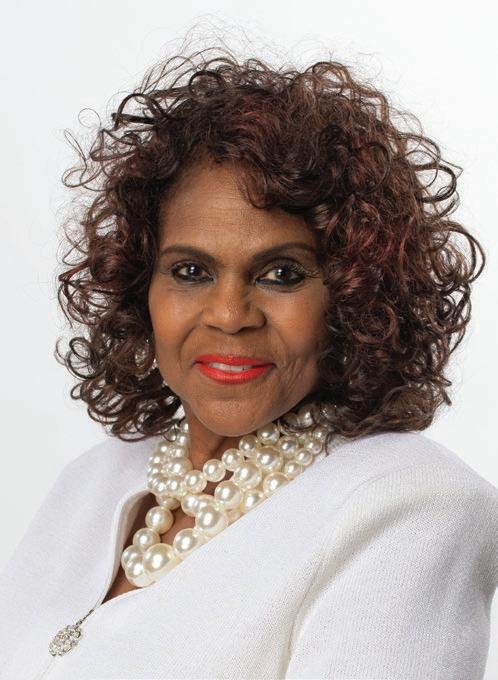
Dr. Deborah Taylor King, International President, Womens Missionary Society of the AME Church
ITHE WOMEN’S MISSIONARY SOCIETY:
Global Christians with a Global Vision Serving A Global God

n 2024, the Women’s Missionary Society (WMS) of the African Methodist Episcopal Church (AMEC) commemorated 150 years of mission and service in the United States, across Africa and around the world. During the Sesquicentennial Celebration, the WMS highlighted “a legendary past casting a phenomenal future”. In the present, through the work of its 20 Episcopal Districts in the U.S., Canada, Africa, India, Haiti and beyond, the WMS continues to answer the call to minister and serve families, women, children and men in need of care, resources, and hope.
Our mission is clear: “We are called to strengthen our faith and sent to continue the ministry of Jesus Christ by service and witness in the world.”
Under the leadership of International President Dr. Deborah Taylor King, the WMS advances this mission globally through strong partnerships, innovative initiatives and steadfast service.
• Global FOCUSES
1| To Empower Women.
2| To Embrace Child Protection, including Spiritual and Mental development.
3| To Eradicate Hunger.
4| To Enhance the significant contribution made by our predecessors.
5| To Equip Missionaries for Global Witness and Ministry.
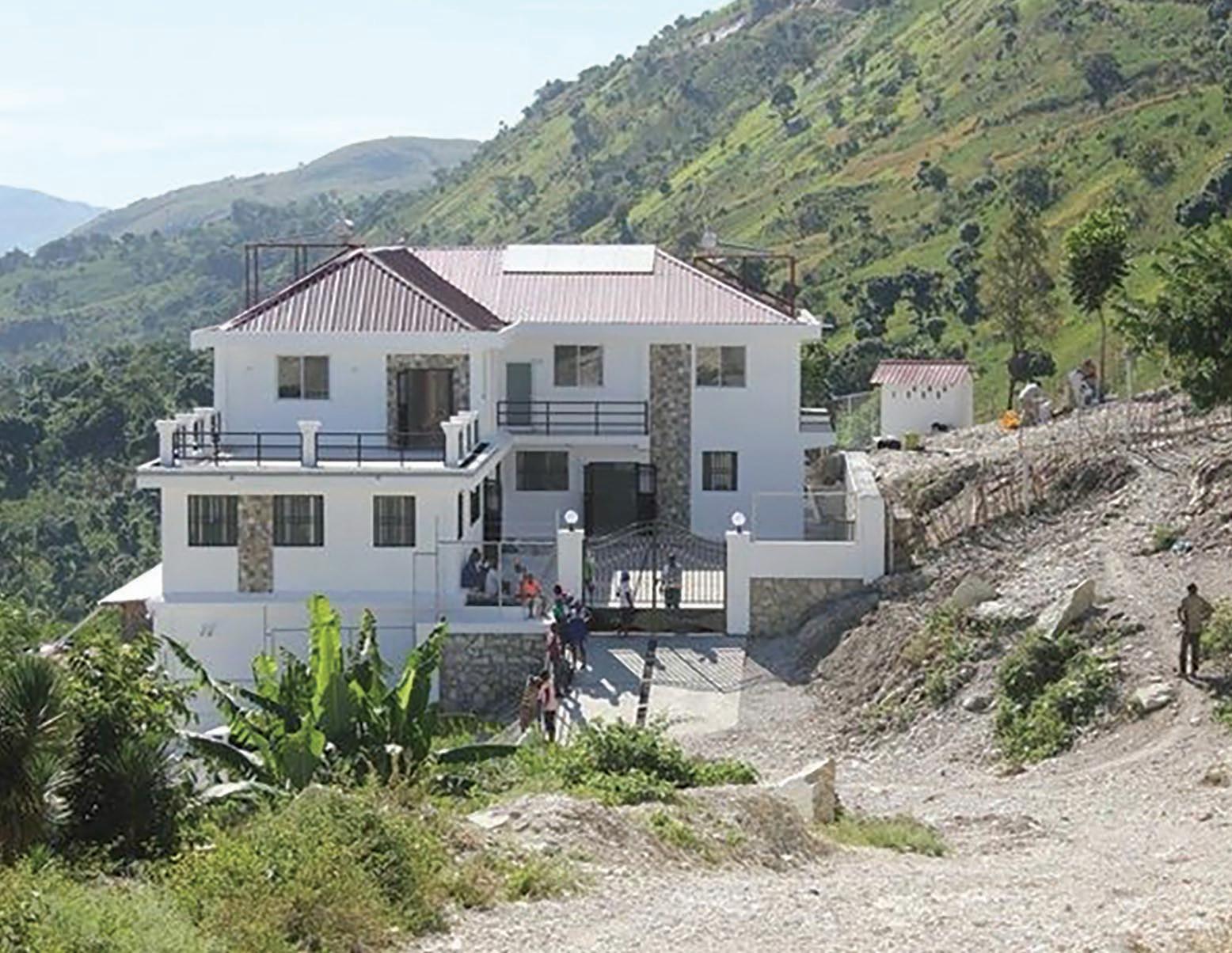
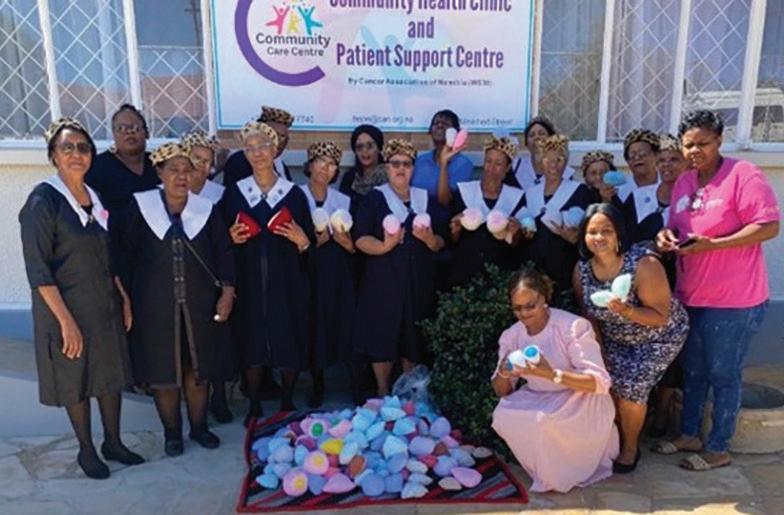
• Global DIMENSIONS
| Building stronger global partnerships to enhance the significant foundation laid by our forerunners.
| Birthing new and innovative initiatives that positively respond to relevant 21st century and intergenerational issues.
| Bridging the gaps for women in education, wealth building, health and wellness and leadership to create a more substantial Global and Intergenerational footprint.
| Branding WMS-AMEC as a powerful force for advocacy and action.
• Global HIGHLIGHTS
| NGO Global Status
In 1985, the United Nations Economic and Social Council granted the WMS Special Consultative Category II Status, recognizing its capacity to address global inequities and injustices. As a Non-Governmental Organization (NGO), the WMS actively responds to the 17 Sustainable Development Goals (SDGs) adopted in 2015. The aim is to end poverty and hunger; improve health and education, reduce inequality, foster economic growth and protect the environment. All Episcopal Districts commit to targeting two or three SDGs during each Quadrennial.
| The Bishop Sarah Davis Clinic in Haiti
In 2017 the WMS partnered with the African Methodist Episcopal Church Service and Development Agency, Inc. (AME-SADA) to establish a new clinic in memory of Bishop Davis, who served as the presiding prelate of the 16th Episcopal District, which includes Haiti, at the time of her passing in 2013. The WMS continues support for the clinic which provides patient exam, treatment rooms, birthing suite, staff lodgings and other essential services for residents seeking critical health services and care.
| The Africa and Global Mercy Ships
Over the past decade, the WMS has partnered with Mercy Ships, a humanitarian organization that provides life-changing surgeries and strengthens healthcare systems in underserved nations. Through consistent contributions, the WMS has helped extend healing to those suffering from painful, disfiguring, and oftenpreventable conditions and has renewed hope to countless lives.
For more information on the global focus, visit www.wms-amec.org.
Haiti Clinic Photo & Mission project in South Africa
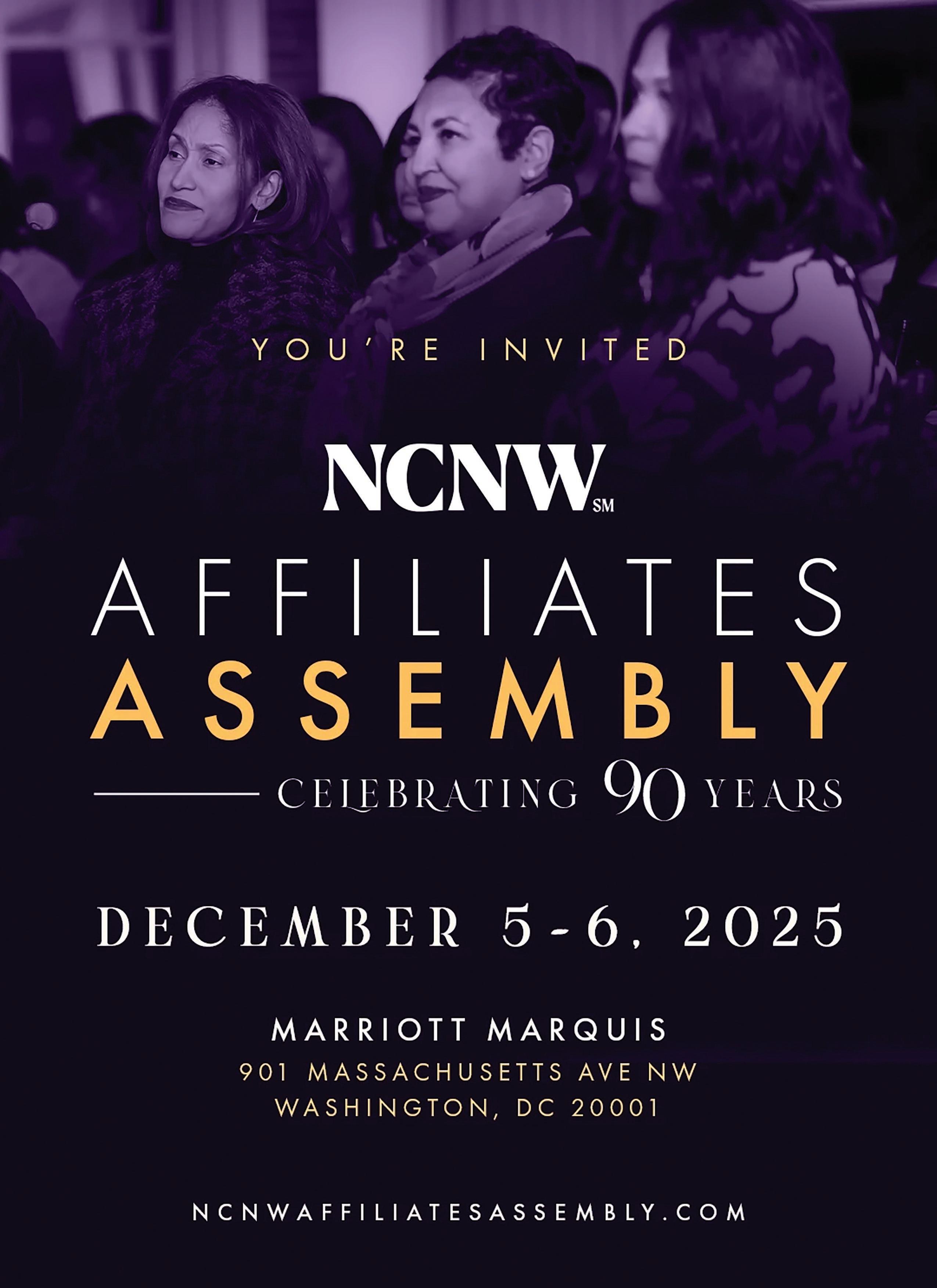
NCNW Headquarters Staff
ADVOCACY AND POLICY
Ja’Lia Taylor Director of Policy, Telecommunications & Technology
Tyese Williams Policy & Advocacy Manager
Micah Jumpp State Advocacy & Policy Manager
Brashanda McCoy Government Relations Coordinator
COMMUNICATIONS
Tonita Perry Chief Communications Officer
Erica Southerland Vice President of Public Affairs & Marketing
Sandra Green Graphics Designer
Ashante Corey-Bey Digital Content Specialist
DEVELOPMENT
Stacey Crooks Vice President of Development & Grants
Faridah Burnett Donor Relations Manager
Stephanie West Development Manager
EXECUTIVE OFFICE
Shavon Arline-Bradley CEO and President
Lisa Hargrove Chief of Staff
Parys Grigsby Director of Executive Operations
Lauren Dew Senior Executive Assistant
Winnie Caldwell Senior PT Executive Assistant
Noel Bernard Director of Security Operation
HUMAN RESOURCES
Delmyra Caesar Vice President of Human Resources
Paula Young Human Resources Generalist
LEGAL & COMPLIANCE
Mareco Edwards General Counsel
Tiffany Royster Associate Council
John Wallace Compliance Manager
MEMBERSHIP
David Glenn, Jr. Vice President of Membership
Danielle Tyson
Membership Manager
Yolanda Sutton Membership Coordinator
Robin Smith Membership Operation Assistant
OPERATIONS
Krystal Ali Chief Operating Officer
Jonathan Townes Operations Manager
LaTarsha Small Finance Specialist
Theresa Dorsey Accountant
Jade Walker Data Evaluation Specialist
William Kruah, Jr. Office Administrator
PROGRAMS & IMPACT
Halima Adenegan Director of Leadership Programs
Afia Williams Senior Manager of Programs
Josette Fullard Program Administrator
In Memoriam

Ms. Joan Durnell Powell
Orange County, California
NCNW Past National Board Member
Ms. Joan Durnell Powell was a beloved leader, advocate, and friend. Joan’s life was a testament to courage, community service, and relentless advocacy for health equity.
Lori Mitchell-Melton Co-op City Section, New York
NCNW Life Member

Joan served as President of the National Council of Negro Women in Orange County, CA. She was also a past National Board Member of NCNW and an active member of Delta Sigma Theta Sorority, Inc.

Joan volunteered her time to civic engagement efforts, voter outreach, and community service. She often said her motto was “Get busy living.” And that she did, whether it be traveling from California or taking to the steps of Capitol Hill. Joan used her voice to demand better health for families nationwide.
NCNW will certainly miss Joan’s presence, yet we will forever cherish the value she added to this organization.
Memoriam written by NCNW National Chair, Dr. A. Lois Keith
Lori Mitchell-Melton, Life Member, Co-op City Section, NY. Lori has been a significant part of the fabric of the Co-op City Section. She has also held the positions of President, 1st Vice President, Youth Committee Chair, and 50th Anniversary Committee Chair, and was the founder of the Co-op City Section’s Signature Black History Program, which will celebrate its 25th Annual program in 2026. Lori was passionate about education and social justice, and advocated against human trafficking, anti-gun violence, voter registration, women’s rights, educational opportunities, and literacy. She was a committed and dedicated member of our organization, attending the 61st Biennial National Convention in October 2024. Lori’s legacy and commitment to our section and organization will live forever.
Sybil O. Raye Life Member
Staten Island, NY

Melanie Yvonne Hill
Former NCNW National Office
Staff Member Washington, DC
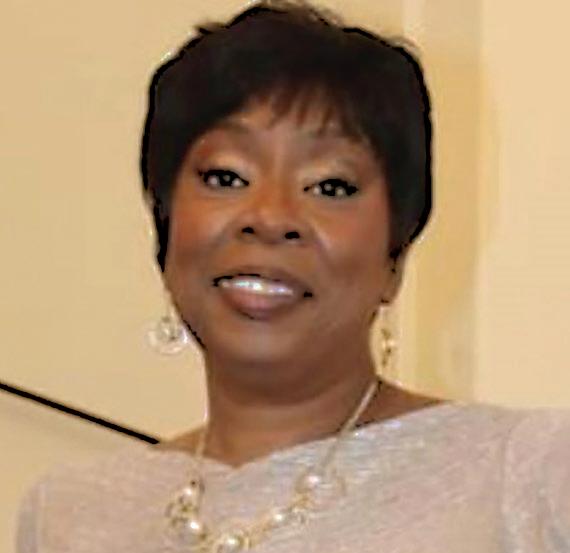

Jimmy Lee Sharpe, Jr. (Husband)
NCNW Mississippi State Coalition
President, Victoria Sharpe
Gulfport, MS
AS OF SEPTEMBER 1, 2025

Sanofi congratulates NCNW’s on its 90th Anniversary.
Sanofi is an R&D driven, AI-powered biopharma company committed to improving people’s lives and creating compelling growth.
We apply our deep understanding of the immune system to invent medicines and vaccines that treat and protect millions of people around the world, with an innovative pipeline that could benefit millions more. Our team is guided by one purpose: we chase the miracles of science to improve people’s lives; this inspires us to drive progress and deliver positive impact for our people and the communities we serve, by addressing the most urgent healthcare, environmental, and societal challenges of our time.

